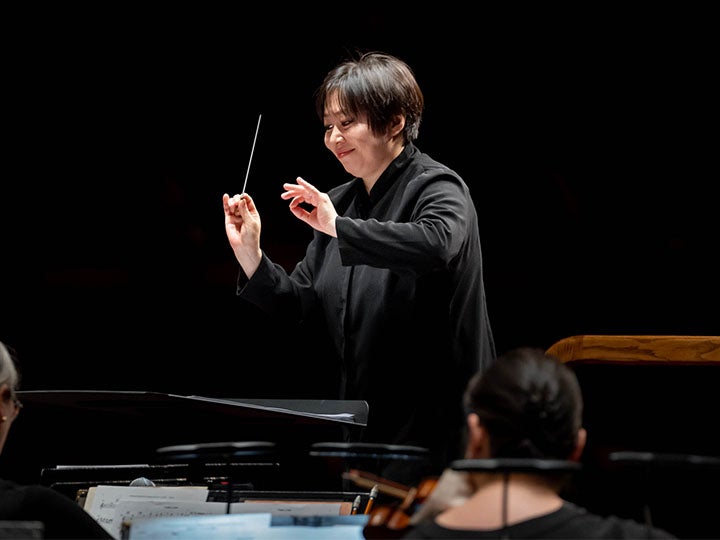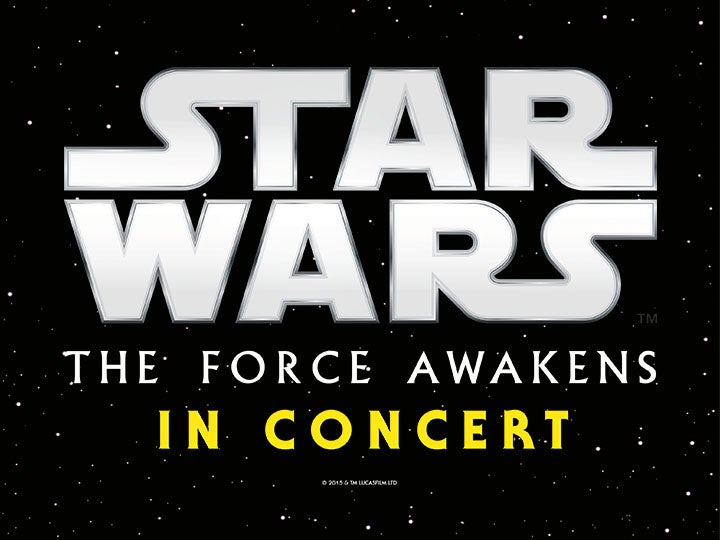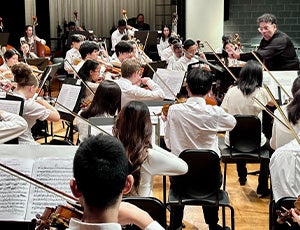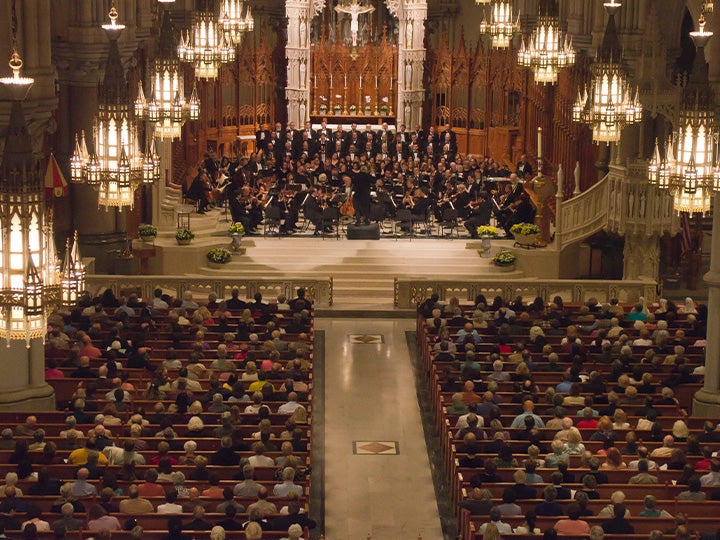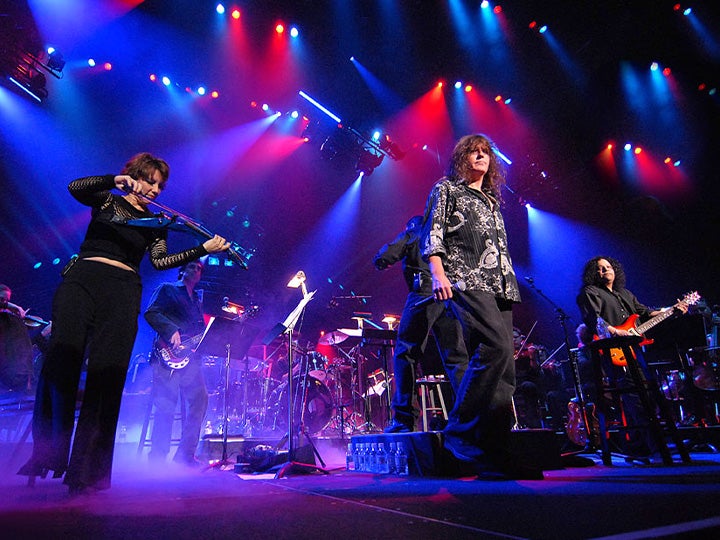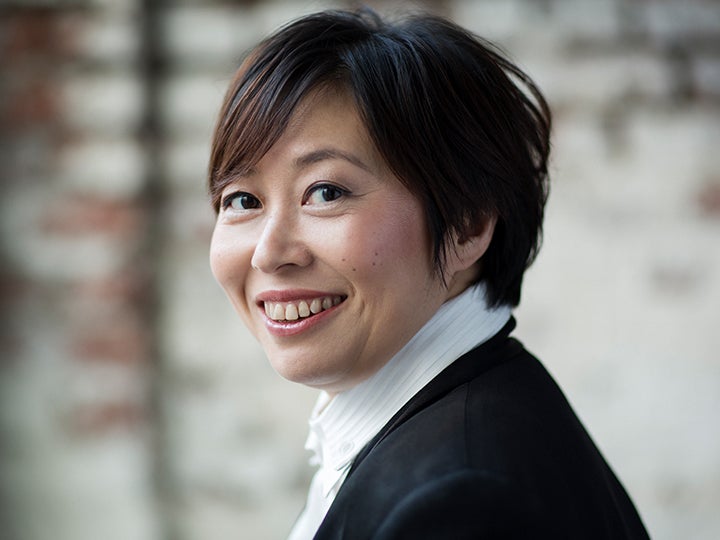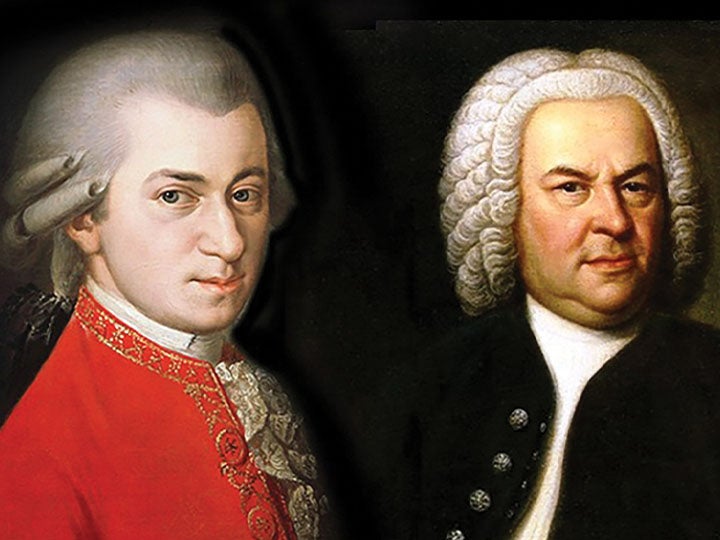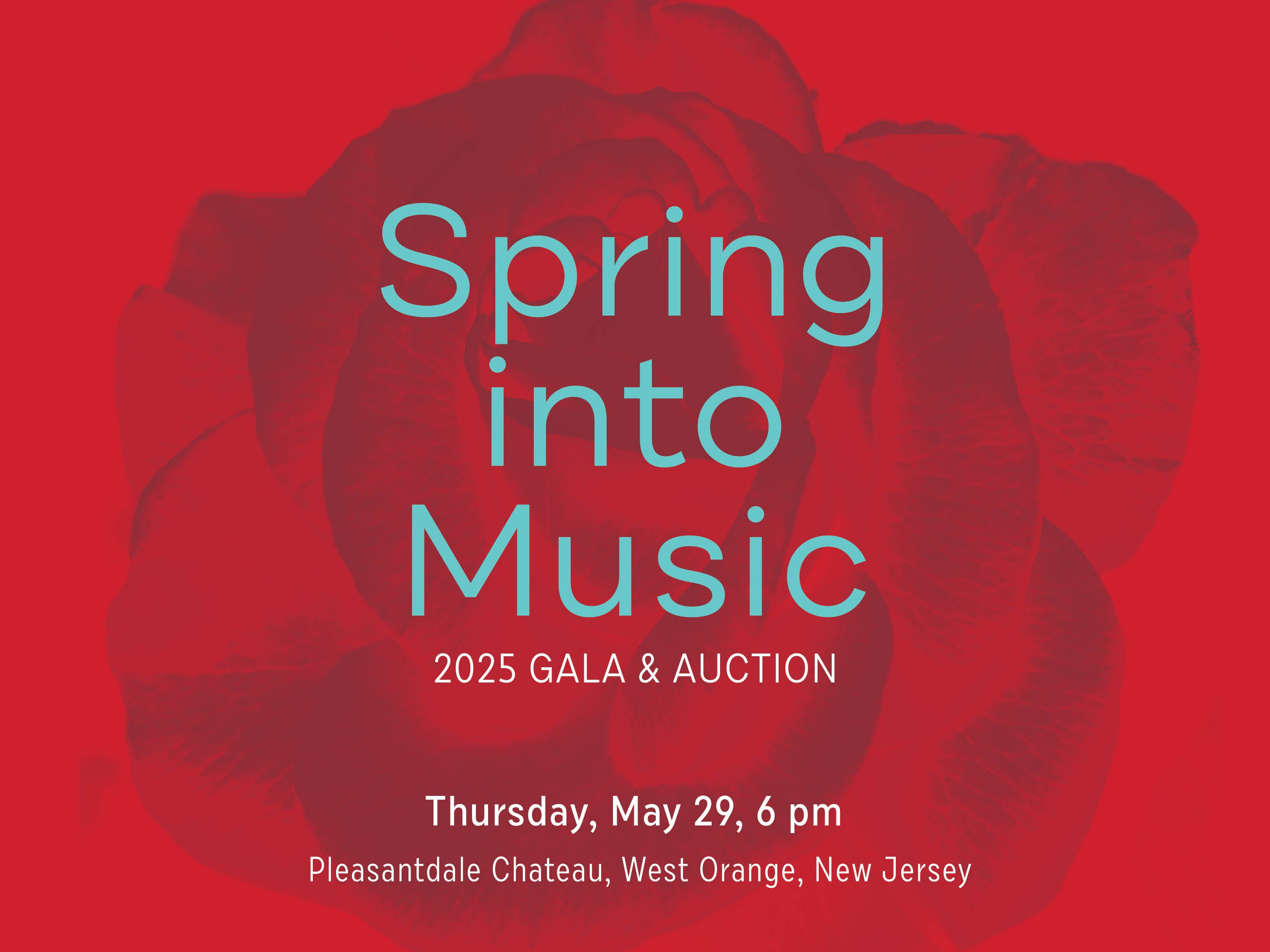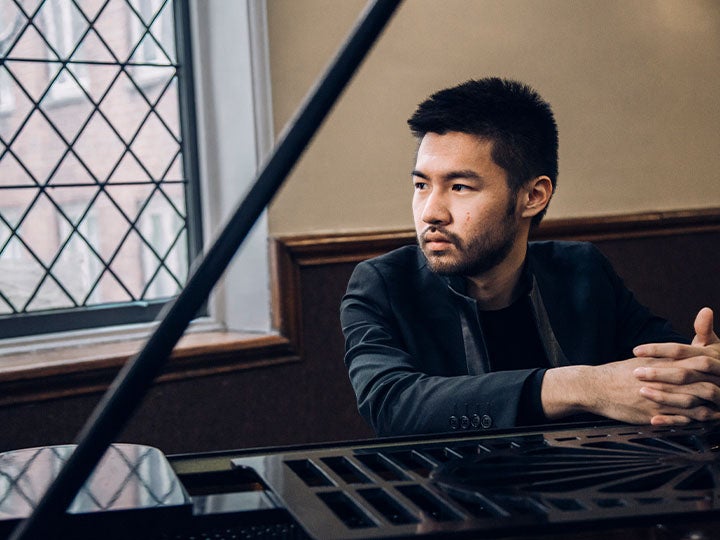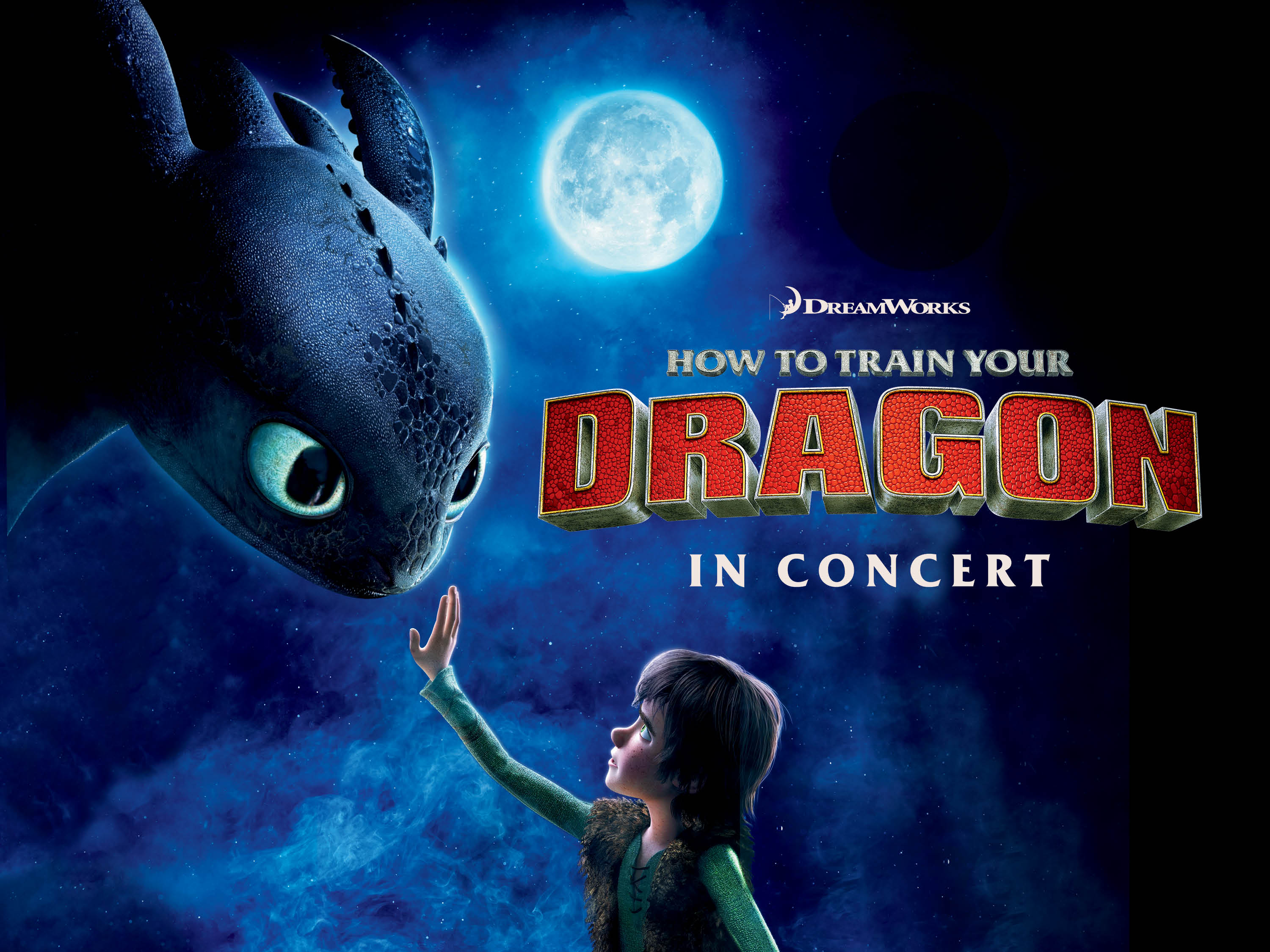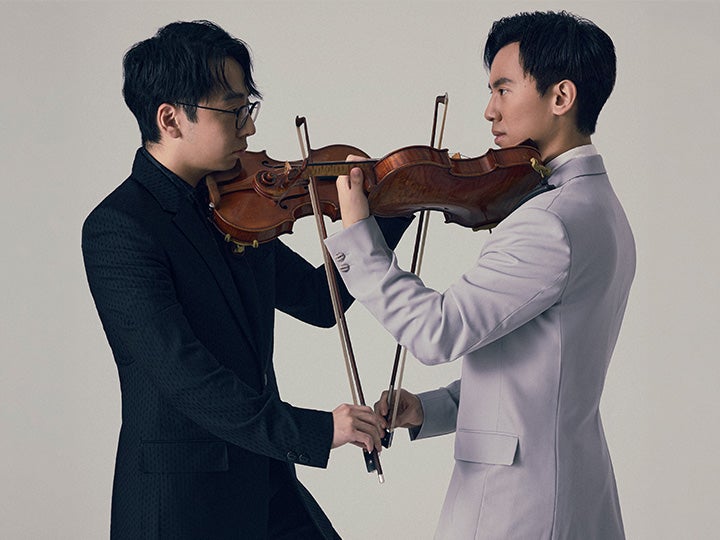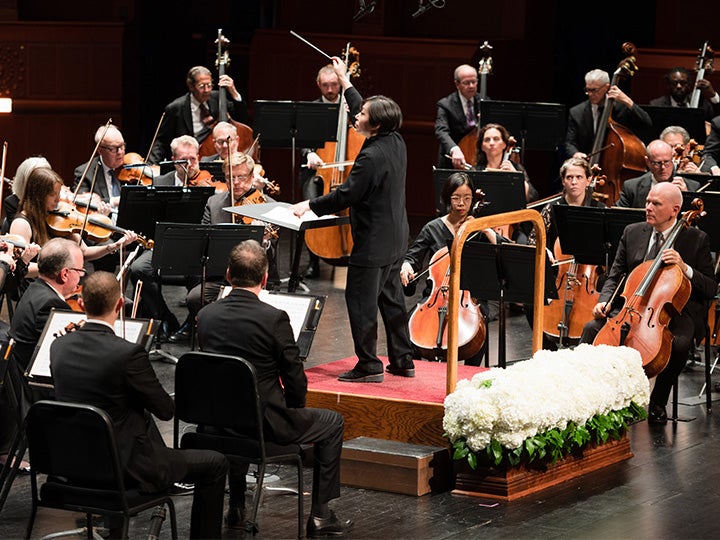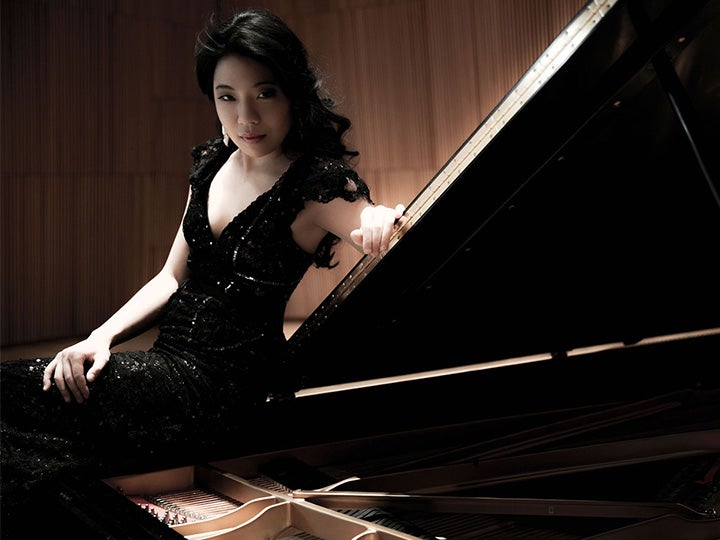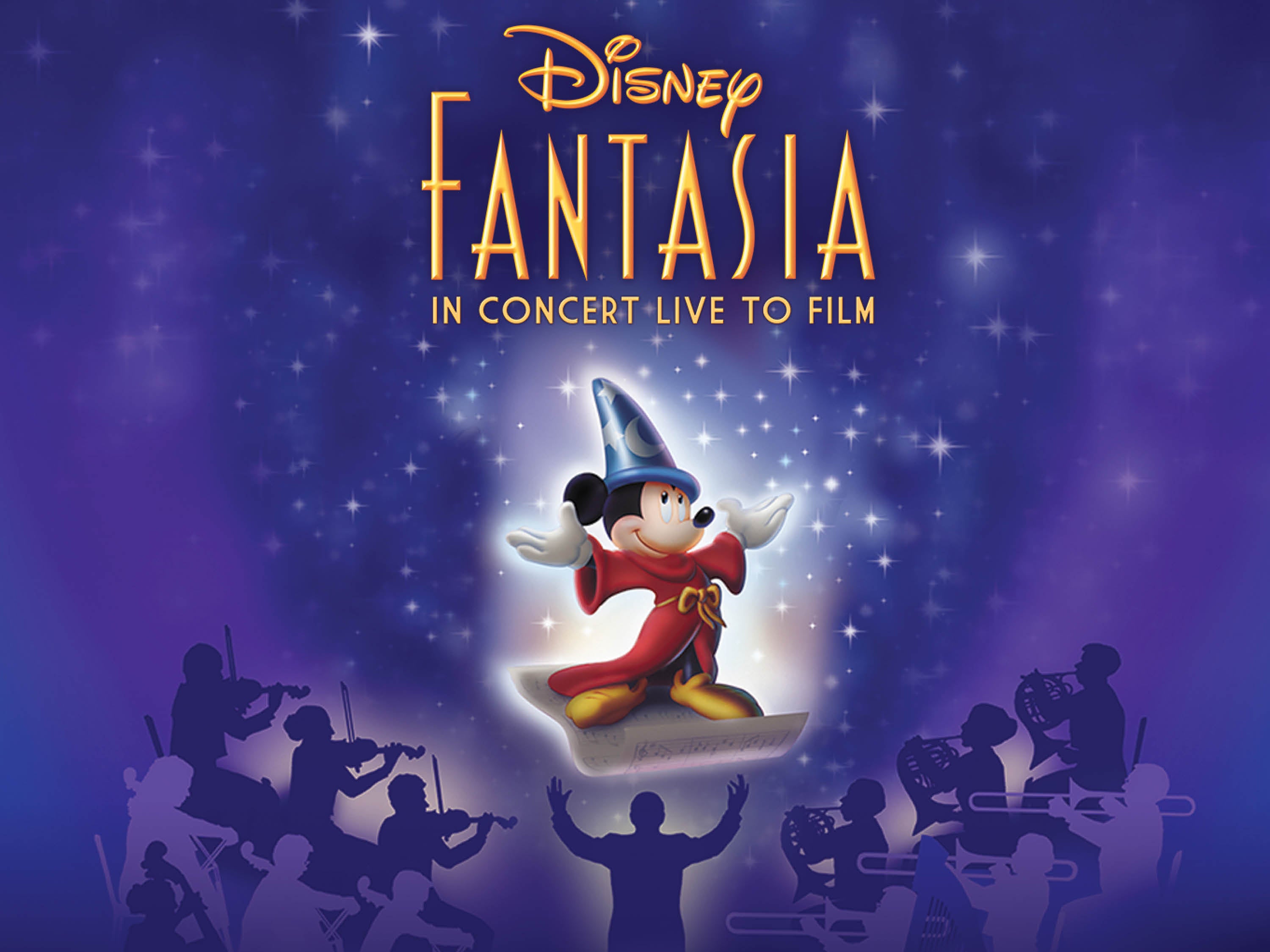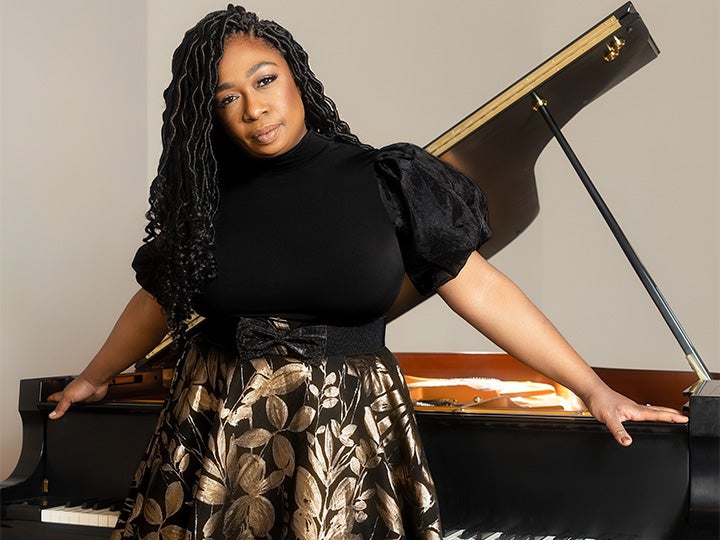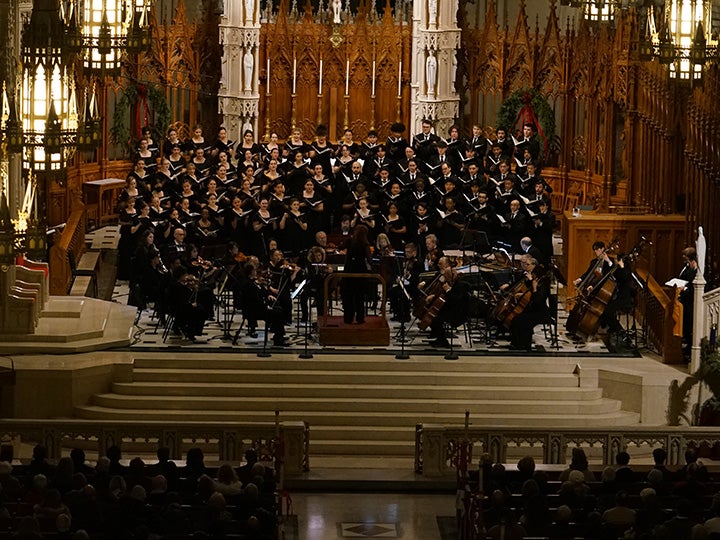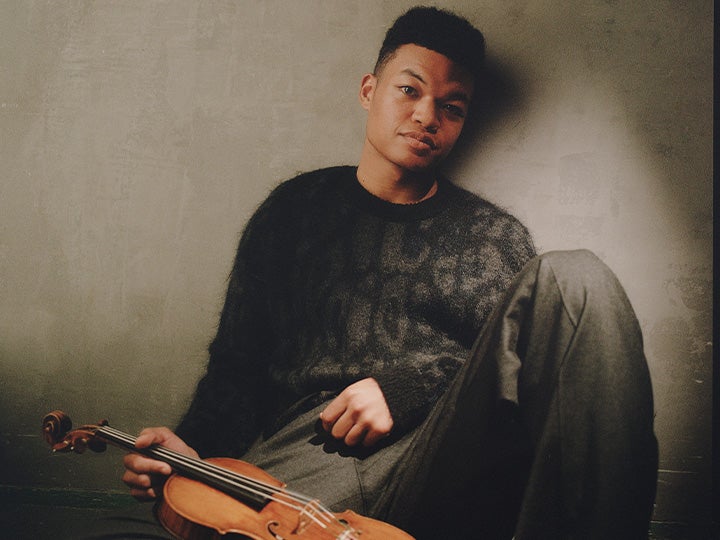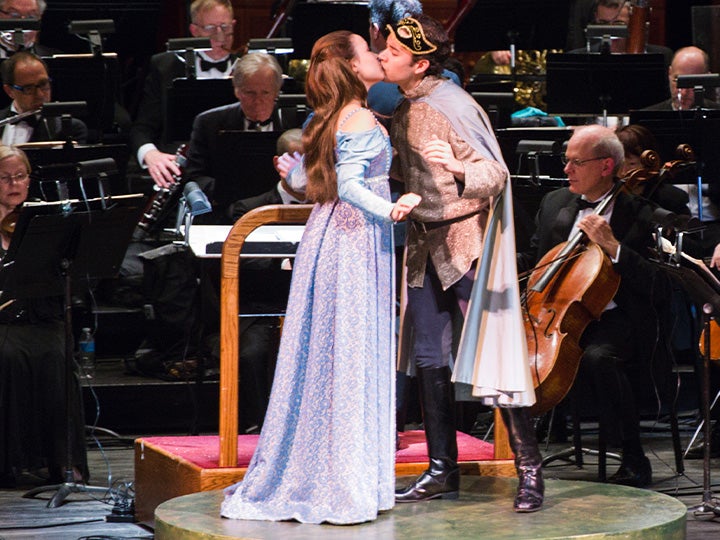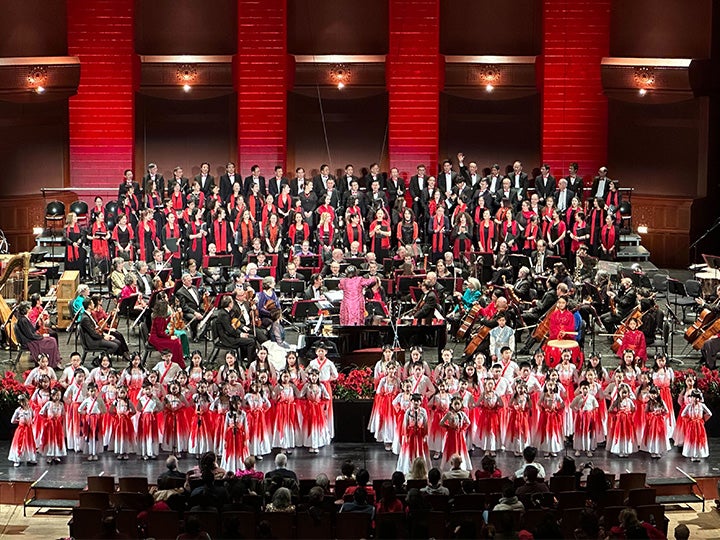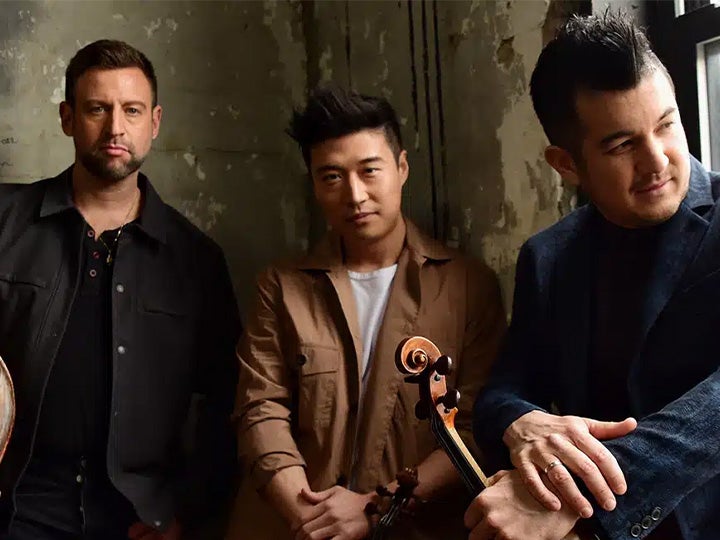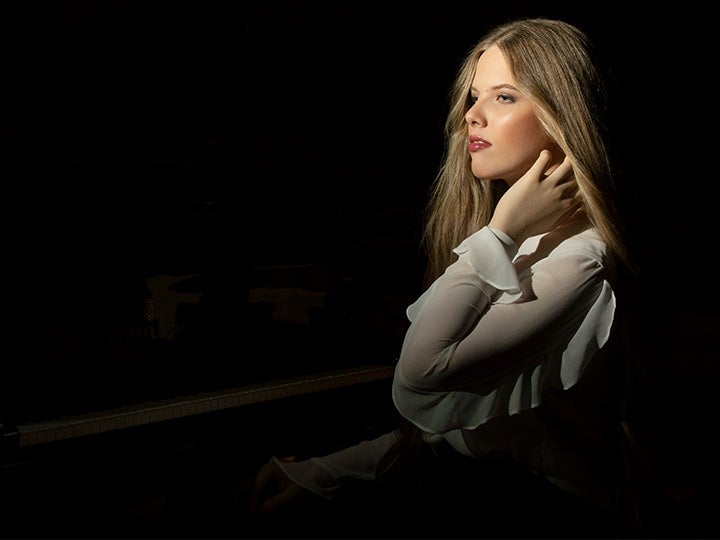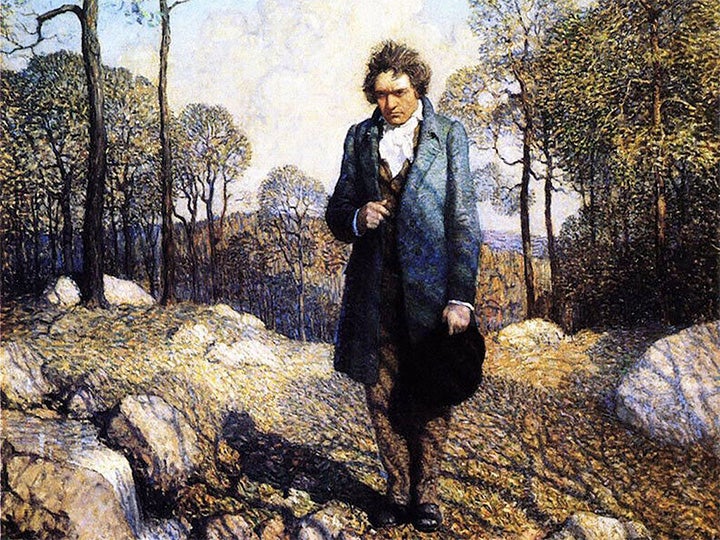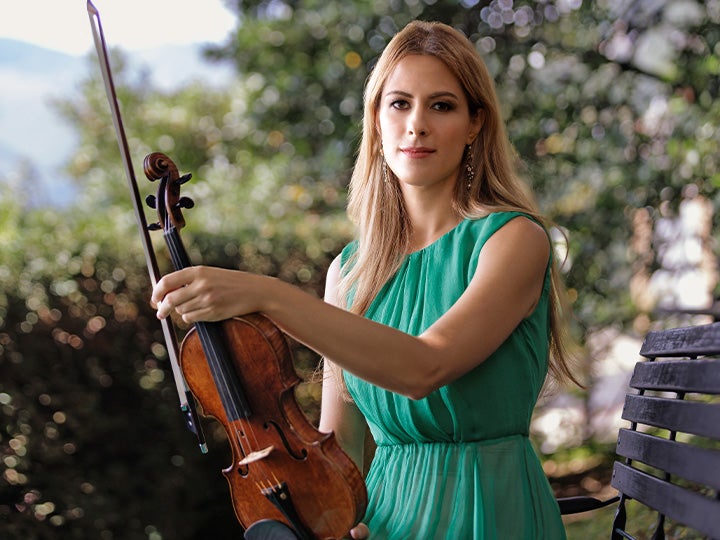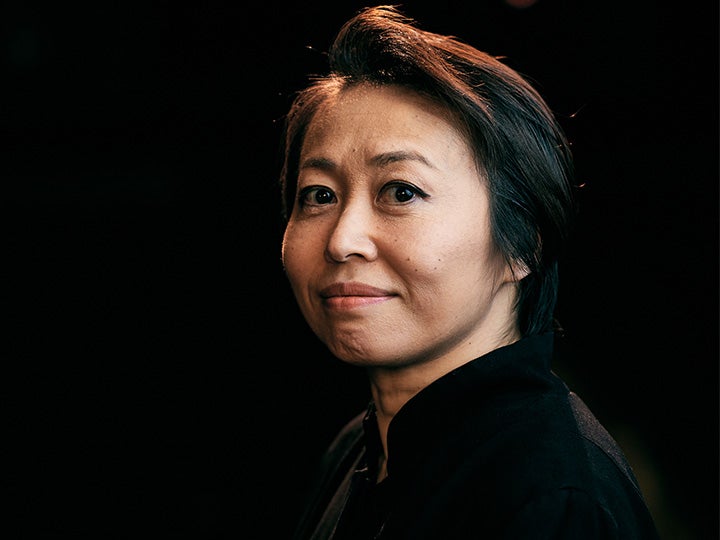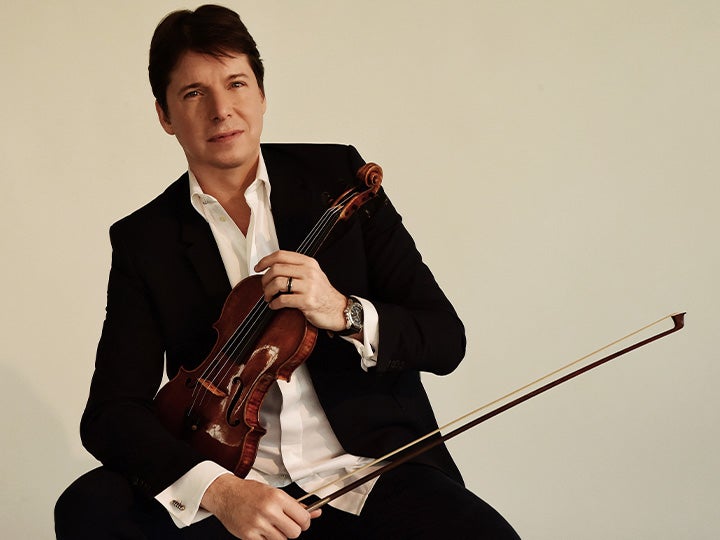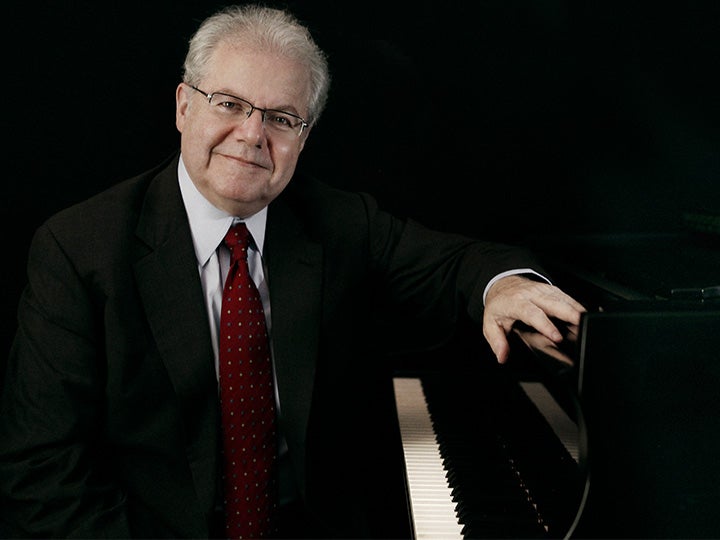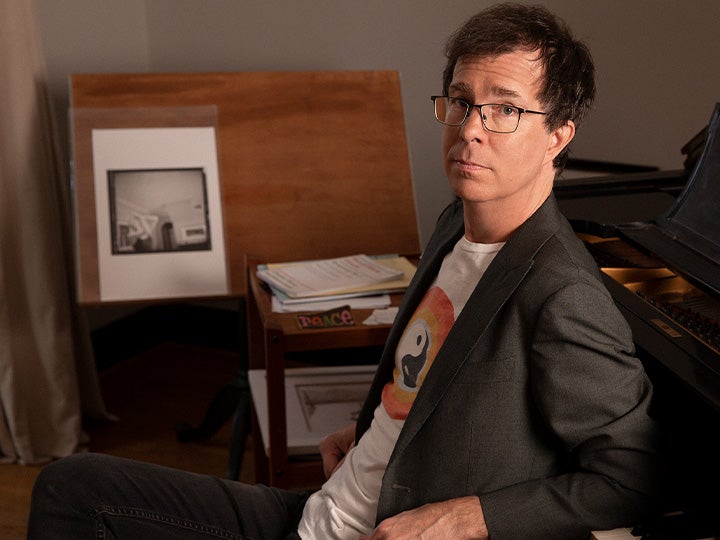Beethoven’s Ninth Symphony with Xian Zhang
New Jersey Symphony Classical
Xian Zhang conductor
Gregory D. McDaniel conductor
Steven Banks saxophone
Felicia Moore soprano
Kelley O’Connor mezzo-soprano
Issachah Savage tenor
Reginald Smith Jr. baritone
Montclair State University Chorale | Heather J. Buchanan, director
New Jersey Symphony
- Pytor Ilyich Tchaikovsky Polonaise from Eugene Onegin
A lavish ball scene, the dashing hero and heroine twirling in splendor—a fun, festive dance lifted from Tchaikovsky’s opera.
- Billy Childs Diaspora
Inspired by Maya Angelou and other poets, Childs’ new concerto was written for the amazing Steven Banks, who says the music “follows the trajectory of the Black experience from Africa before slave trade to now, going forward in hope.”
- Ludwig van Beethoven Symphony No. 9, “Choral”
The sheer volcanic power of Beethoven’s music makes the Ninth’s message soar. “Brotherhood! Joy!”—our world needs these clarion calls now more than ever.
Performed in Newark and New Brunswick
Beethoven’s Ninth Symphony with Xian Zhang
New Jersey Symphony Classical
Xian Zhang conductor
Gregory D. McDaniel conductor
Steven Banks saxophone
Felicia Moore soprano
Kelley O’Connor mezzo-soprano
Issachah Savage tenor
Reginald Smith Jr. baritone
Montclair State University Chorale | Heather J. Buchanan, director
New Jersey Symphony
- Pytor Ilyich Tchaikovsky Polonaise from Eugene Onegin
A lavish ball scene, the dashing hero and heroine twirling in splendor—a fun, festive dance lifted from Tchaikovsky’s opera.
- Billy Childs Diaspora
Inspired by Maya Angelou and other poets, Childs’ new concerto was written for the amazing Steven Banks, who says the music “follows the trajectory of the Black experience from Africa before slave trade to now, going forward in hope.”
- Ludwig van Beethoven Symphony No. 9, “Choral”
The sheer volcanic power of Beethoven’s music makes the Ninth’s message soar. “Brotherhood! Joy!”—our world needs these clarion calls now more than ever.
Performed in Newark and New Brunswick
Beethoven’s Ninth Symphony with Xian Zhang
New Jersey Symphony Classical
Xian Zhang conductor
Gregory D. McDaniel conductor
Steven Banks saxophone
Felicia Moore soprano
Kelley O’Connor mezzo-soprano
Issachah Savage tenor
Reginald Smith Jr. baritone
Montclair State University Chorale | Heather J. Buchanan, director
New Jersey Symphony
- Pytor Ilyich Tchaikovsky Polonaise from Eugene Onegin
A lavish ball scene, the dashing hero and heroine twirling in splendor—a fun, festive dance lifted from Tchaikovsky’s opera.
- Billy Childs Diaspora
Inspired by Maya Angelou and other poets, Childs’ new concerto was written for the amazing Steven Banks, who says the music “follows the trajectory of the Black experience from Africa before slave trade to now, going forward in hope.”
- Ludwig van Beethoven Symphony No. 9, “Choral”
The sheer volcanic power of Beethoven’s music makes the Ninth’s message soar. “Brotherhood! Joy!”—our world needs these clarion calls now more than ever.
Performed in Newark and New Brunswick
Beethoven’s Ninth Symphony with Xian Zhang
New Jersey Symphony Classical
Xian Zhang conductor
Gregory D. McDaniel conductor
Steven Banks saxophone
Felicia Moore soprano
Kelley O’Connor mezzo-soprano
Issachah Savage tenor
Reginald Smith Jr. baritone
Montclair State University Chorale | Heather J. Buchanan, director
New Jersey Symphony
- Pytor Ilyich Tchaikovsky Polonaise from Eugene Onegin
A lavish ball scene, the dashing hero and heroine twirling in splendor—a fun, festive dance lifted from Tchaikovsky’s opera.
- Billy Childs Diaspora
Inspired by Maya Angelou and other poets, Childs’ new concerto was written for the amazing Steven Banks, who says the music “follows the trajectory of the Black experience from Africa before slave trade to now, going forward in hope.”
- Ludwig van Beethoven Symphony No. 9, “Choral”
The sheer volcanic power of Beethoven’s music makes the Ninth’s message soar. “Brotherhood! Joy!”—our world needs these clarion calls now more than ever.
Performed in Newark and New Brunswick
Star Wars: The Force Awakens in Concert
New Jersey Symphony at the Movies
Constantine Kitsopoulos conductor
New Jersey Symphony
Thirty years after the defeat of the Empire, Luke Skywalker has vanished, and a new threat has risen: The First Order, led by the mysterious Supreme Leader Snoke and his enforcer, Kylo Ren. General Leia Organa’s military force, the Resistance—and unlikely heroes brought together by fate—are the galaxy’s only hope. Experience the complete film with the New Jersey Symphony performing John Williams’ thrilling score live.
Performed in Red Bank, Morristown, Newark and New Brunswick
Star Wars: The Force Awakens in Concert
New Jersey Symphony at the Movies
Constantine Kitsopoulos conductor
New Jersey Symphony
Thirty years after the defeat of the Empire, Luke Skywalker has vanished, and a new threat has risen: The First Order, led by the mysterious Supreme Leader Snoke and his enforcer, Kylo Ren. General Leia Organa’s military force, the Resistance—and unlikely heroes brought together by fate—are the galaxy’s only hope. Experience the complete film with the New Jersey Symphony performing John Williams’ thrilling score live.
Performed in Red Bank, Morristown, Newark and New Brunswick
Star Wars: The Force Awakens in Concert
New Jersey Symphony at the Movies
Constantine Kitsopoulos conductor
New Jersey Symphony
Thirty years after the defeat of the Empire, Luke Skywalker has vanished, and a new threat has risen: The First Order, led by the mysterious Supreme Leader Snoke and his enforcer, Kylo Ren. General Leia Organa’s military force, the Resistance—and unlikely heroes brought together by fate—are the galaxy’s only hope. Experience the complete film with the New Jersey Symphony performing John Williams’ thrilling score live.
Performed in Red Bank, Morristown, Newark and New Brunswick
Star Wars: The Force Awakens in Concert
New Jersey Symphony at the Movies
Constantine Kitsopoulos conductor
New Jersey Symphony
Thirty years after the defeat of the Empire, Luke Skywalker has vanished, and a new threat has risen: The First Order, led by the mysterious Supreme Leader Snoke and his enforcer, Kylo Ren. General Leia Organa’s military force, the Resistance—and unlikely heroes brought together by fate—are the galaxy’s only hope. Experience the complete film with the New Jersey Symphony performing John Williams’ thrilling score live.
Performed in Red Bank, Morristown, Newark and New Brunswick
Youth Orchestra Spring Concert
Two performances in one day! | Youth Orchestra Showcase
Diego García artistic director, The Anna P. Drago Chair
Terrence Thornhill associate conductor & curriculum specialist
New Jersey Symphony Youth Orchestra, The Resident Youth Orchestra of the John J. Cali School of Music at Montclair State University
The New Jersey Symphony Youth Orchestra will showcase 300 talented young musicians across two performances as part of their annual Spring Concert on Sunday, April 27 in Newark. Experience vibrant performances and celebrate the achievements of the 2024–25 season, including a special tribute to the graduating seniors.
Performed in Newark
Youth Orchestra Spring Concert
Two performances in one day! | Youth Orchestra Showcase
Diego García artistic director, The Anna P. Drago Chair
Terrence Thornhill associate conductor & curriculum specialist
New Jersey Symphony Youth Orchestra, The Resident Youth Orchestra of the John J. Cali School of Music at Montclair State University
The New Jersey Symphony Youth Orchestra will showcase 300 talented young musicians across two performances as part of their annual Spring Concert on Sunday, April 27 in Newark. Experience vibrant performances and celebrate the achievements of the 2024–25 season, including a special tribute to the graduating seniors.
Performed in Newark
Haydn’s Creation
New Jersey Symphony at the Cathedral
John J. Miller conductor
Lorraine Ernest soprano
Theodore Chletsos tenor
Jorge Ocasio bass-baritone
The Archdiocesan Festival Choir
The Cathedral Choir
New Jersey Symphony
The Cathedral Basilica of the Sacred Heart in Newark, NJ invites all to experience the music of Franz Joseph Haydn’s The Creation, featuring The Archdiocesan Festival Choir, The Cathedral Choir, vocal soloists and the New Jersey Symphony with John J. Miller conducting.
Performed in Newark
The Music of Led Zeppelin
Featuring hits like “Kashmir,” “Black Dog,” “Stairway to Heaven” and more!
Brent Havens conductor & arranger
Windborne Music Group
Justin Sargent vocalist
New Jersey Symphony
The New Jersey Symphony and Windborne Music Group bridge the gulf between classical music and rock n’ roll to present The Music of Led Zeppelin, celebrating the best of the legendary classic rock group. Amplified with full-on guitars and screaming vocals, sing and dance along as Led Zeppelin’s “sheer blast and power” is put on full display riff for riff with new musical colors. Timeless hits like “Kashmir,” “Black Dog,” “Stairway to Heaven” and more will get you on your feet in this special concert you don’t want to miss!
Performed in Englewood and New Brunswick
The Music of Led Zeppelin
Featuring hits like “Kashmir,” “Black Dog,” “Stairway to Heaven” and more!
Brent Havens conductor & arranger
Windborne Music Group
Justin Sargent vocalist
New Jersey Symphony
The New Jersey Symphony and Windborne Music Group bridge the gulf between classical music and rock n’ roll to present The Music of Led Zeppelin, celebrating the best of the legendary classic rock group. Amplified with full-on guitars and screaming vocals, sing and dance along as Led Zeppelin’s “sheer blast and power” is put on full display riff for riff with new musical colors. Timeless hits like “Kashmir,” “Black Dog,” “Stairway to Heaven” and more will get you on your feet in this special concert you don’t want to miss!
Performed in Englewood and New Brunswick
Xian Conducts Mozart
New Jersey Symphony musicians take the spotlight!
Xian Zhang conductor
Eric Wyrick violin
Francine Storck violin
New Jersey Symphony
- Wolfgang Amadeus Mozart Eine kleine Nachtmusik
Mozart may have tossed this off for a Viennese party one evening, but there is no piece more charming and beguiling than his “a little night music.”
- Johann Sebastian Bach Double Concerto for Two Violins
The spotlight’s on our two superstar principal violins, Eric Wyrick and Francine Storck, in perhaps the most beautiful duet ever created.
- Michael Abels Delights and Dances
Delight in this imaginative, bluesy work for solo string quartet and string orchestra, with New Jersey Symphony’s own musicians taking the spotlight in a series of captivating solos.
- Wolfgang Amadeus Mozart Symphony No. 35, “Haffner”
Mozart had intended to jot down a little occasional piece, but brilliant music kept pouring out of his pen until he’d made a dazzling full-fledged symphony, one of his best.
Performed in Princeton and Newark
Discover Mozart & Bach
New Jersey Symphony Family Concert:
A Music Discovery Zone
Xian Zhang conductor
Gregory D. McDaniel conductor
Bill Barclay host
Eric Wyrick violin
Francine Storck violin
Annamaria Witek cello
New Jersey Symphony
Discover what makes a live orchestra concert so special. We’ll take a deep dive into works by Mozart, as well as J.S. Bach’s incredibly famous Double Concerto for Two Violins. Also featured on the program is 2024 Henry Lewis Concerto Competition winner, cellist Annamaria Witek. Inspired by Leonard Bernstein’s masterful way of putting young audiences at the center of music-making, this interactive concert will feature inside tips, listening cues and fun facts that make for the perfect Saturday afternoon family outing!
- Wolfgang Amadeus Mozart Selection from Eine kleine Nachtmusik
- Camille Saint-Saëns Selection from Cello Concerto No. 1
- Johann Sebastian Bach Double Concerto for Two Violins
- Wolfgang Amadeus Mozart Symphony No. 35, “Haffner”
Performed in Newark
Xian Conducts Mozart
New Jersey Symphony musicians take the spotlight!
Xian Zhang conductor
Eric Wyrick violin
Francine Storck violin
New Jersey Symphony
- Wolfgang Amadeus Mozart Eine kleine Nachtmusik
Mozart may have tossed this off for a Viennese party one evening, but there is no piece more charming and beguiling than his “a little night music.”
- Johann Sebastian Bach Double Concerto for Two Violins
The spotlight’s on our two superstar principal violins, Eric Wyrick and Francine Storck, in perhaps the most beautiful duet ever created.
- Michael Abels Delights and Dances
Delight in this imaginative, bluesy work for solo string quartet and string orchestra, with New Jersey Symphony’s own musicians taking the spotlight in a series of captivating solos.
- Wolfgang Amadeus Mozart Symphony No. 35, “Haffner”
Mozart had intended to jot down a little occasional piece, but brilliant music kept pouring out of his pen until he’d made a dazzling full-fledged symphony, one of his best.
Performed in Princeton and Newark
Xian Conducts Mozart
New Jersey Symphony musicians take the spotlight!
Xian Zhang conductor
Eric Wyrick violin
Francine Storck violin
New Jersey Symphony
- Wolfgang Amadeus Mozart Eine kleine Nachtmusik
Mozart may have tossed this off for a Viennese party one evening, but there is no piece more charming and beguiling than his “a little night music.”
- Johann Sebastian Bach Double Concerto for Two Violins
The spotlight’s on our two superstar principal violins, Eric Wyrick and Francine Storck, in perhaps the most beautiful duet ever created.
- Michael Abels Delights and Dances
Delight in this imaginative, bluesy work for solo string quartet and string orchestra, with New Jersey Symphony’s own musicians taking the spotlight in a series of captivating solos.
- Wolfgang Amadeus Mozart Symphony No. 35, “Haffner”
Mozart had intended to jot down a little occasional piece, but brilliant music kept pouring out of his pen until he’d made a dazzling full-fledged symphony, one of his best.
Performed in Princeton and Newark
2025 Spring into Music Gala & Auction
Gala Reception and Dinner, Concert and Auction
Join the New Jersey Symphony and an array of cultural, social, business and civic leaders for an unforgettable evening of fine dining and entertainment as we honor former Governor Thomas H. Kean and his dedication to the performing arts industry in New Jersey. The event will feature a lavish cocktail reception with a few dazzling surprises, a dinner with a private performance featuring members of the New Jersey Symphony and students of the New Jersey Symphony Youth Orchestra and a silent auction.
Presented in West Orange
Rachmaninoff and Shostakovich
Season Finale | New Jersey Symphony Classical
Xian Zhang conductor
Conrad Tao piano
New Jersey Symphony
- Sergei Rachmaninoff Piano Concerto No. 2
No piece has introduced and won more people to classical music than Rachmaninoff’s magnificent work for piano and orchestra.
- Dmitri Shostakovich Symphony No. 5
When Shostakovich’s Fifth received a half-hour standing ovation at its premiere, the world knew that a classic was born—and it remains a landmark work for the virtuoso orchestra.
Performed in Morristown, Princeton, Red Bank and Newark
Rachmaninoff and Shostakovich
Season Finale | New Jersey Symphony Classical
Xian Zhang conductor
Conrad Tao piano
New Jersey Symphony
- Sergei Rachmaninoff Piano Concerto No. 2
No piece has introduced and won more people to classical music than Rachmaninoff’s magnificent work for piano and orchestra.
- Dmitri Shostakovich Symphony No. 5
When Shostakovich’s Fifth received a half-hour standing ovation at its premiere, the world knew that a classic was born—and it remains a landmark work for the virtuoso orchestra.
Performed in Morristown, Princeton, Red Bank and Newark
Rachmaninoff and Shostakovich
Season Finale | New Jersey Symphony Classical
Xian Zhang conductor
Conrad Tao piano
New Jersey Symphony
- Sergei Rachmaninoff Piano Concerto No. 2
No piece has introduced and won more people to classical music than Rachmaninoff’s magnificent work for piano and orchestra.
- Dmitri Shostakovich Symphony No. 5
When Shostakovich’s Fifth received a half-hour standing ovation at its premiere, the world knew that a classic was born—and it remains a landmark work for the virtuoso orchestra.
Performed in Morristown, Princeton, Red Bank and Newark
Rachmaninoff and Shostakovich
Season Finale | New Jersey Symphony Classical
Xian Zhang conductor
Conrad Tao piano
New Jersey Symphony
- Sergei Rachmaninoff Piano Concerto No. 2
No piece has introduced and won more people to classical music than Rachmaninoff’s magnificent work for piano and orchestra.
- Dmitri Shostakovich Symphony No. 5
When Shostakovich’s Fifth received a half-hour standing ovation at its premiere, the world knew that a classic was born—and it remains a landmark work for the virtuoso orchestra.
Performed in Morristown, Princeton, Red Bank and Newark
How to Train Your Dragon in Concert
New Jersey Symphony at the Movies
Lawrence Loh conductor
New Jersey Symphony
DreamWorks’ How to Train Your Dragon is a captivating and original story about a young Viking named Hiccup, who defies tradition when he befriends one of his deadliest foes—a ferocious dragon he calls Toothless. Together, these unlikely heroes must fight against all odds to save both their worlds. Featuring John Powell’s Oscar-nominated score performed live to picture, How to Train Your Dragon in Concert is a thrilling experience for all ages.
Performed in Morristown, New Brunswick and Newark
How to Train Your Dragon in Concert
New Jersey Symphony at the Movies
Lawrence Loh conductor
New Jersey Symphony
DreamWorks’ How to Train Your Dragon is a captivating and original story about a young Viking named Hiccup, who defies tradition when he befriends one of his deadliest foes—a ferocious dragon he calls Toothless. Together, these unlikely heroes must fight against all odds to save both their worlds. Featuring John Powell’s Oscar-nominated score performed live to picture, How to Train Your Dragon in Concert is a thrilling experience for all ages.
Performed in Morristown, New Brunswick and Newark
How to Train Your Dragon in Concert
New Jersey Symphony at the Movies
Lawrence Loh conductor
New Jersey Symphony
DreamWorks’ How to Train Your Dragon is a captivating and original story about a young Viking named Hiccup, who defies tradition when he befriends one of his deadliest foes—a ferocious dragon he calls Toothless. Together, these unlikely heroes must fight against all odds to save both their worlds. Featuring John Powell’s Oscar-nominated score performed live to picture, How to Train Your Dragon in Concert is a thrilling experience for all ages.
Performed in Morristown, New Brunswick and Newark
TwoSet Violin with the New Jersey Symphony
Part of the TwoSet Violin World Tour
TwoSet Violin
New Jersey Symphony
World-famous YouTube classical music comedy duo TwoSet Violin take the stage with the New Jersey Symphony for a wide-ranging night of musical fun! Violinists Eddy Chen and Brett Yang will take their unique brand of earnest and silly musical comedy to a new level in this performance, with the backing of a full symphony orchestra.
Performed in Newark
Opening Night Celebration
Dinner Prelude, Concert and After-Party
You are invited to the New Jersey Symphony’s 2025 Season Opening Celebration honoring Xian Zhang’s 10th season as Music Director. Guests will enjoy an elegant dinner prelude, the season opening concert featuring Music Director Xian Zhang, guest artist Joyce Yang and the New Jersey Symphony and a dessert after-party.
Presented in Newark
Tchaikovsky’s Piano Concerto No. 1
Opening Weekend | New Jersey Symphony Classical
Xian Zhang conductor
Joyce Yang piano
New Jersey Symphony
- Jessie Montgomery Hymn for Everyone
We launch the season with Montgomery’s open-arms musical welcome. In her Hymn for Everyone you’ll hear an echo of “Lift Every Voice and Sing,” often called the Black National Anthem.
- Pyotr Ilyich Tchaikovsky Piano Concerto No. 1
Slammed as a flop at its premiere, Tchaikovsky more than had the last laugh: here’s jaw-dropping virtuosity for the soloist, sweeping melodies for the orchestra, and an audience favorite around the world.
- Antonín Dvořák Symphony No. 8
Dvořák’s pen might as well have been a paint brush. In his tuneful Eighth you can practically see autumn’s most vivid colors and the heart-melting glow of an October sunset.
Performed in Newark and Red Bank
Tchaikovsky’s Piano Concerto No. 1
Opening Weekend | New Jersey Symphony Classical
Xian Zhang conductor
Joyce Yang piano
New Jersey Symphony
- Jessie Montgomery Hymn for Everyone
We launch the season with Montgomery’s open-arms musical welcome. In her Hymn for Everyone you’ll hear an echo of “Lift Every Voice and Sing,” often called the Black National Anthem.
- Pyotr Ilyich Tchaikovsky Piano Concerto No. 1
Slammed as a flop at its premiere, Tchaikovsky more than had the last laugh: here’s jaw-dropping virtuosity for the soloist, sweeping melodies for the orchestra, and an audience favorite around the world.
- Antonín Dvořák Symphony No. 8
Dvořák’s pen might as well have been a paint brush. In his tuneful Eighth you can practically see autumn’s most vivid colors and the heart-melting glow of an October sunset.
Performed in Newark and Red Bank
Tchaikovsky’s Piano Concerto No. 1
Opening Weekend | New Jersey Symphony Classical
Xian Zhang conductor
Joyce Yang piano
New Jersey Symphony
- Jessie Montgomery Hymn for Everyone
We launch the season with Montgomery’s open-arms musical welcome. In her Hymn for Everyone you’ll hear an echo of “Lift Every Voice and Sing,” often called the Black National Anthem.
- Pyotr Ilyich Tchaikovsky Piano Concerto No. 1
Slammed as a flop at its premiere, Tchaikovsky more than had the last laugh: here’s jaw-dropping virtuosity for the soloist, sweeping melodies for the orchestra, and an audience favorite around the world.
- Antonín Dvořák Symphony No. 8
Dvořák’s pen might as well have been a paint brush. In his tuneful Eighth you can practically see autumn’s most vivid colors and the heart-melting glow of an October sunset.
Performed in Newark and Red Bank
Disney’s Fantasia in Concert
New Jersey Symphony at the Movies
Constantine Kitsopoulos conductor
New Jersey Symphony
Experience Disney’s groundbreaking marriage of symphonic music and animation, Fantasia. Beloved repertoire from the original 1940 version and Fantasia 2000, including The Sorcerer’s Apprentice, Beethoven’s Fifth Symphony, and The Nutcracker Suite, will be performed by the New Jersey Symphony while Disney’s stunning footage is shown on the big screen. Enjoy iconic moments and childhood favorites like never before!
Performed in Morristown, Red Bank and New Brunswick
Disney’s Fantasia in Concert
New Jersey Symphony at the Movies
Constantine Kitsopoulos conductor
New Jersey Symphony
Experience Disney’s groundbreaking marriage of symphonic music and animation, Fantasia. Beloved repertoire from the original 1940 version and Fantasia 2000, including The Sorcerer’s Apprentice, Beethoven’s Fifth Symphony, and The Nutcracker Suite, will be performed by the New Jersey Symphony while Disney’s stunning footage is shown on the big screen. Enjoy iconic moments and childhood favorites like never before!
Performed in Morristown, Red Bank and New Brunswick
Disney’s Fantasia in Concert
New Jersey Symphony at the Movies
Constantine Kitsopoulos conductor
New Jersey Symphony
Experience Disney’s groundbreaking marriage of symphonic music and animation, Fantasia. Beloved repertoire from the original 1940 version and Fantasia 2000, including The Sorcerer’s Apprentice, Beethoven’s Fifth Symphony, and The Nutcracker Suite, will be performed by the New Jersey Symphony while Disney’s stunning footage is shown on the big screen. Enjoy iconic moments and childhood favorites like never before!
Performed in Morristown, Red Bank and New Brunswick
Rhapsody in Blue
Plus works by Florence Price & Carlos Simon!
Tito Muñoz conductor
Michelle Cann piano
New Jersey Symphony
- Florence Price Piano Concerto in One Movement
An American genius, Florence Price mixes luscious lyricism with ragtime stomp. This recently unearthed gem won Cann—the leading interpreter of Price’s piano music—a 2023 GRAMMY.
- George Gershwin Rhapsody in Blue
United Airlines knows a good tune when it hears one, and that melody is the heartbeat of Gershwin’s classic. But not before the famous swooping clarinet solo gets this piece of the Roaring Twenties underway.
- Carlos Simon Zodiac (Northeast Premiere, New Jersey Symphony Co-Commission)
Carlos Simon is one of America’s leading contemporary composers, and in his latest music, a proud co-commission of the New Jersey Symphony, Simon gives voice to all 12 zodiac signs—the music at turns fiery, ethereal, and soaring.
- Aaron Copland Suite from Billy the Kid
Cowboy songs, folk tunes, and a visionary composer—all the ingredients that made Copland’s wild-west ballet a hit in the ‘30s and a favorite still.
Performed in Newark, Princeton and New Brunswick
Rhapsody in Blue
Plus works by Florence Price & Carlos Simon!
Tito Muñoz conductor
Michelle Cann piano
New Jersey Symphony
- Florence Price Piano Concerto in One Movement
An American genius, Florence Price mixes luscious lyricism with ragtime stomp. This recently unearthed gem won Cann—the leading interpreter of Price’s piano music—a 2023 GRAMMY.
- George Gershwin Rhapsody in Blue
United Airlines knows a good tune when it hears one, and that melody is the heartbeat of Gershwin’s classic. But not before the famous swooping clarinet solo gets this piece of the Roaring Twenties underway.
- Carlos Simon Zodiac (Northeast Premiere, New Jersey Symphony Co-Commission)
Carlos Simon is one of America’s leading contemporary composers, and in his latest music, a proud co-commission of the New Jersey Symphony, Simon gives voice to all 12 zodiac signs—the music at turns fiery, ethereal, and soaring.
- Aaron Copland Suite from Billy the Kid
Cowboy songs, folk tunes, and a visionary composer—all the ingredients that made Copland’s wild-west ballet a hit in the ‘30s and a favorite still.
Performed in Newark, Princeton and New Brunswick
Discover Rhapsody
in Blue
New Jersey Symphony Family Concert
Tito Muñoz conductor
Michelle Cann piano
New Jersey Symphony
Discover what makes a live orchestra concert so special. We’ll take a deep dive into one of the greatest American piano concertos, Gershwin’s Rhapsody in Blue, followed by Copland’s lively Suite from Billy the Kid.
Performed in Newark
Rhapsody in Blue
Plus works by Florence Price & Carlos Simon!
Tito Muñoz conductor
Michelle Cann piano
New Jersey Symphony
- Florence Price Piano Concerto in One Movement
An American genius, Florence Price mixes luscious lyricism with ragtime stomp. This recently unearthed gem won Cann—the leading interpreter of Price’s piano music—a 2023 GRAMMY.
- George Gershwin Rhapsody in Blue
United Airlines knows a good tune when it hears one, and that melody is the heartbeat of Gershwin’s classic. But not before the famous swooping clarinet solo gets this piece of the Roaring Twenties underway.
- Carlos Simon Zodiac (Northeast Premiere, New Jersey Symphony Co-Commission)
Carlos Simon is one of America’s leading contemporary composers, and in his latest music, a proud co-commission of the New Jersey Symphony, Simon gives voice to all 12 zodiac signs—the music at turns fiery, ethereal, and soaring.
- Aaron Copland Suite from Billy the Kid
Cowboy songs, folk tunes, and a visionary composer—all the ingredients that made Copland’s wild-west ballet a hit in the ‘30s and a favorite still.
Performed in Newark, Princeton and New Brunswick
Rhapsody in Blue
Plus works by Florence Price & Carlos Simon!
Tito Muñoz conductor
Michelle Cann piano
New Jersey Symphony
- Florence Price Piano Concerto in One Movement
An American genius, Florence Price mixes luscious lyricism with ragtime stomp. This recently unearthed gem won Cann—the leading interpreter of Price’s piano music—a 2023 GRAMMY.
- George Gershwin Rhapsody in Blue
United Airlines knows a good tune when it hears one, and that melody is the heartbeat of Gershwin’s classic. But not before the famous swooping clarinet solo gets this piece of the Roaring Twenties underway.
- Carlos Simon Zodiac (Northeast Premiere, New Jersey Symphony Co-Commission)
Carlos Simon is one of America’s leading contemporary composers, and in his latest music, a proud co-commission of the New Jersey Symphony, Simon gives voice to all 12 zodiac signs—the music at turns fiery, ethereal, and soaring.
- Aaron Copland Suite from Billy the Kid
Cowboy songs, folk tunes, and a visionary composer—all the ingredients that made Copland’s wild-west ballet a hit in the ‘30s and a favorite still.
Performed in Newark, Princeton and New Brunswick
Elf in Concert
New Jersey Symphony at the Movies
Conner Gray Covington conductor
New Jersey Symphony
Buddy was accidentally transported to the North Pole as a toddler and raised to adulthood among Santa’s elves. Unable to shake the feeling that he doesn’t fit in, the adult Buddy travels to New York, in full elf uniform, in search of his real father. This holiday season, relive this heartwarming holiday classic on a giant screen as every note of John Debney’s wonderful score is played live to picture in: Elf in Concert!
Performed in Newark and Red Bank
Elf in Concert
New Jersey Symphony at the Movies
Conner Gray Covington conductor
New Jersey Symphony
Buddy was accidentally transported to the North Pole as a toddler and raised to adulthood among Santa’s elves. Unable to shake the feeling that he doesn’t fit in, the adult Buddy travels to New York, in full elf uniform, in search of his real father. This holiday season, relive this heartwarming holiday classic on a giant screen as every note of John Debney’s wonderful score is played live to picture in: Elf in Concert!
Performed in Newark and Red Bank
Handel’s Messiah
New Jersey Symphony Holiday Tradition
Anthony Parnther conductor
Caitlin Gotimer soprano
Maria Dominique Lopez mezzo-soprano
Orson Van Gay II tenor
Shyheim Selvan Hinnant bass-baritone
Montclair State University Singers | Heather J. Buchanan, director
New Jersey Symphony
Handel’s Messiah embraces every emotion, from the first voice singing “Comfort ye,” inviting you to step aside from the season’s frenzy, to the riveting Amen Chorus at the end. In between are moments of transcendence, loss, and deeply-felt awe—what makes a classic a classic.
Performed in Princeton and Newark
Handel’s Messiah
New Jersey Symphony Holiday Tradition
Anthony Parnther conductor
Caitlin Gotimer soprano
Maria Dominique Lopez mezzo-soprano
Orson Van Gay II tenor
Shyheim Selvan Hinnant bass-baritone
Montclair State University Singers | Heather J. Buchanan, director
New Jersey Symphony
Handel’s Messiah embraces every emotion, from the first voice singing “Comfort ye,” inviting you to step aside from the season’s frenzy, to the riveting Amen Chorus at the end. In between are moments of transcendence, loss, and deeply-felt awe—what makes a classic a classic.
Performed in Princeton and Newark
Handel’s Messiah
New Jersey Symphony Holiday Tradition
Anthony Parnther conductor
Caitlin Gotimer soprano
Maria Dominique Lopez mezzo-soprano
Orson Van Gay II tenor
Shyheim Selvan Hinnant bass-baritone
Montclair State University Singers | Heather J. Buchanan, director
New Jersey Symphony
Handel’s Messiah embraces every emotion, from the first voice singing “Comfort ye,” inviting you to step aside from the season’s frenzy, to the riveting Amen Chorus at the end. In between are moments of transcendence, loss, and deeply-felt awe—what makes a classic a classic.
Performed in Princeton and Newark
Randall Goosby Returns
New Jersey Symphony Classical
Xian Zhang conductor
Randall Goosby violin
New Jersey Symphony
- Jean Sibelius Finlandia
Eight minutes that saved a nation. When Finland wrestled itself free from the Russian bear, Sibelius’ music was the Finns’ call to courage.
- Samuel Barber Violin Concerto
The most gorgeous violin concerto of the 20th century: the first two movements exquisitely touching, and the third a wild sprint for only the bravest of soloists.
- Pytor Ilyich Tchaikovsky Symphony No. 2, “Ukrainian”
Three Ukrainian folksongs were all Tchaikovsky needed for inspiration. From them, he spun his most joyful symphony.
Performed in New Brunswick, Princeton, Newark and Morristown
Randall Goosby Returns
New Jersey Symphony Classical
Xian Zhang conductor
Randall Goosby violin
New Jersey Symphony
- Jean Sibelius Finlandia
Eight minutes that saved a nation. When Finland wrestled itself free from the Russian bear, Sibelius’ music was the Finns’ call to courage.
- Samuel Barber Violin Concerto
The most gorgeous violin concerto of the 20th century: the first two movements exquisitely touching, and the third a wild sprint for only the bravest of soloists.
- Pytor Ilyich Tchaikovsky Symphony No. 2, “Ukrainian”
Three Ukrainian folksongs were all Tchaikovsky needed for inspiration. From them, he spun his most joyful symphony.
Performed in New Brunswick, Princeton, Newark and Morristown
Randall Goosby Returns
New Jersey Symphony Classical
Xian Zhang conductor
Randall Goosby violin
New Jersey Symphony
- Jean Sibelius Finlandia
Eight minutes that saved a nation. When Finland wrestled itself free from the Russian bear, Sibelius’ music was the Finns’ call to courage.
- Samuel Barber Violin Concerto
The most gorgeous violin concerto of the 20th century: the first two movements exquisitely touching, and the third a wild sprint for only the bravest of soloists.
- Pytor Ilyich Tchaikovsky Symphony No. 2, “Ukrainian”
Three Ukrainian folksongs were all Tchaikovsky needed for inspiration. From them, he spun his most joyful symphony.
Performed in New Brunswick, Princeton, Newark and Morristown
Randall Goosby Returns
New Jersey Symphony Classical
Xian Zhang conductor
Randall Goosby violin
New Jersey Symphony
- Jean Sibelius Finlandia
Eight minutes that saved a nation. When Finland wrestled itself free from the Russian bear, Sibelius’ music was the Finns’ call to courage.
- Samuel Barber Violin Concerto
The most gorgeous violin concerto of the 20th century: the first two movements exquisitely touching, and the third a wild sprint for only the bravest of soloists.
- Pytor Ilyich Tchaikovsky Symphony No. 2, “Ukrainian”
Three Ukrainian folksongs were all Tchaikovsky needed for inspiration. From them, he spun his most joyful symphony.
Performed in New Brunswick, Princeton, Newark and Morristown
Romeo & Juliet
Featuring The Shakespeare Theatre of New Jersey
Xian Zhang conductor
The Shakespeare Theatre of New Jersey
New Jersey Symphony
- Pytor Ilyich Tchaikovsky Romeo and Juliet Fantasy Overture
Tchaikovsky gives you all the passion and drama of Shakespeare’s two young lovers, as the New Jersey Symphony becomes a storyteller in real time.
- Sergei Prokofiev Selections from Romeo and Juliet
Considered too difficult, even undanceable at its unveiling, Prokofiev’s ballet with scene after scene of strikingly original music soon became the treasure of every ballet house the world over.
Performed in Newark and Red Bank
Romeo & Juliet
Featuring The Shakespeare Theatre of New Jersey
Xian Zhang conductor
The Shakespeare Theatre of New Jersey
New Jersey Symphony
- Pytor Ilyich Tchaikovsky Romeo and Juliet Fantasy Overture
Tchaikovsky gives you all the passion and drama of Shakespeare’s two young lovers, as the New Jersey Symphony becomes a storyteller in real time.
- Sergei Prokofiev Selections from Romeo and Juliet
Considered too difficult, even undanceable at its unveiling, Prokofiev’s ballet with scene after scene of strikingly original music soon became the treasure of every ballet house the world over.
Performed in Newark and Red Bank
Romeo & Juliet
Featuring The Shakespeare Theatre of New Jersey
Xian Zhang conductor
The Shakespeare Theatre of New Jersey
New Jersey Symphony
- Pytor Ilyich Tchaikovsky Romeo and Juliet Fantasy Overture
Tchaikovsky gives you all the passion and drama of Shakespeare’s two young lovers, as the New Jersey Symphony becomes a storyteller in real time.
- Sergei Prokofiev Selections from Romeo and Juliet
Considered too difficult, even undanceable at its unveiling, Prokofiev’s ballet with scene after scene of strikingly original music soon became the treasure of every ballet house the world over.
Performed in Newark and Red Bank
Romeo & Juliet
Featuring The Shakespeare Theatre of New Jersey
Xian Zhang conductor
The Shakespeare Theatre of New Jersey
New Jersey Symphony
- Pytor Ilyich Tchaikovsky Romeo and Juliet Fantasy Overture
Tchaikovsky gives you all the passion and drama of Shakespeare’s two young lovers, as the New Jersey Symphony becomes a storyteller in real time.
- Sergei Prokofiev Selections from Romeo and Juliet
Considered too difficult, even undanceable at its unveiling, Prokofiev’s ballet with scene after scene of strikingly original music soon became the treasure of every ballet house the world over.
Performed in Newark and Red Bank
2026 Lunar New Year Celebration
Celebration of the Year of the Horse
Sunny Xia conductor
Haochen Zhang piano
Peking University Alumni Chorus
New Jersey Symphony
Enjoy an evening of community and cultural exchange that is wonderful for families and children, as we celebrate the Year of the Horse. Seattle Symphony Associate Conductor Sunny Xia and Van Cliburn International Piano Competition Winner Haochen Zhang make their New Jersey Symphony debuts in this festive concert that celebrates music from East and West.
Performed in Newark
Beethoven’s Fifth Symphony
Time for Three Performs Contact
Markus Stenz conductor
Time for Three
Ranaan Meyer double bass | Nick Kendall violin | Charles Yang violin
New Jersey Symphony
- Richard Wagner Prelude to Act I of Lohengrin
It begins with the strings alone playing a whisperquiet passage of holy serenity. Soon the whole orchestra joins and builds in a full-throated cry. Wagner’s operatic stage is set for the arrival of the knight Lohengrin sent on a mission from God.
- Kevin Puts Contact
Time for Three, a self-described “classically trained garage band,” brings you the GRAMMY Award-winning concerto written for them by Pulitzer Prize-winning composer Kevin Puts. Created during the isolation of the early pandemic, Contact is “an expression of yearning for the fundamental need” of human connection.
- Ludwig van Beethoven Symphony No. 5
Four notes—dah, dah, dah, DAH—launched Beethoven’s Fifth in 1808 and have stamped all of western classical music since.
Performed in Morristown and Newark
Beethoven’s Fifth Symphony
Time for Three Performs Contact
Markus Stenz conductor
Time for Three
Ranaan Meyer double bass | Nick Kendall violin | Charles Yang violin
New Jersey Symphony
- Richard Wagner Prelude to Act I of Lohengrin
It begins with the strings alone playing a whisperquiet passage of holy serenity. Soon the whole orchestra joins and builds in a full-throated cry. Wagner’s operatic stage is set for the arrival of the knight Lohengrin sent on a mission from God.
- Kevin Puts Contact
Time for Three, a self-described “classically trained garage band,” brings you the GRAMMY Award-winning concerto written for them by Pulitzer Prize-winning composer Kevin Puts. Created during the isolation of the early pandemic, Contact is “an expression of yearning for the fundamental need” of human connection.
- Ludwig van Beethoven Symphony No. 5
Four notes—dah, dah, dah, DAH—launched Beethoven’s Fifth in 1808 and have stamped all of western classical music since.
Performed in Morristown and Newark
Beethoven’s Fifth Symphony
Time for Three Performs Contact
Markus Stenz conductor
Time for Three
Ranaan Meyer double bass | Nick Kendall violin | Charles Yang violin
New Jersey Symphony
- Richard Wagner Prelude to Act I of Lohengrin
It begins with the strings alone playing a whisperquiet passage of holy serenity. Soon the whole orchestra joins and builds in a full-throated cry. Wagner’s operatic stage is set for the arrival of the knight Lohengrin sent on a mission from God.
- Kevin Puts Contact
Time for Three, a self-described “classically trained garage band,” brings you the GRAMMY Award-winning concerto written for them by Pulitzer Prize-winning composer Kevin Puts. Created during the isolation of the early pandemic, Contact is “an expression of yearning for the fundamental need” of human connection.
- Ludwig van Beethoven Symphony No. 5
Four notes—dah, dah, dah, DAH—launched Beethoven’s Fifth in 1808 and have stamped all of western classical music since.
Performed in Morristown and Newark
Bartók’s Concerto
for Orchestra
New Jersey Symphony Classical
Ruth Reinhardt conductor
Eva Gevorgyan piano
New Jersey Symphony
- Béla Bartók Romanian Folk Dances
Informed by his numerous research trips across Hungary, this short and spry set of folk dances bursts with Transylvanian flavor and energy.
- Frédéric Chopin Piano Concerto No. 2
There are moments here that make time, and your breath, stand still. If ever you need evidence of the human spirit’s capacity for beauty, look to this remarkable creation of 20-year-old Chopin.
- Béla Bartók Concerto for Orchestra
Every section of the orchestra gets the spotlight to dazzling effect, and the Concerto’s last moments are some of the most thrilling in all classical music.
Performed in Newark, Princeton, Red Bank and New Brunswick
Bartók’s Concerto
for Orchestra
New Jersey Symphony Classical
Ruth Reinhardt conductor
Eva Gevorgyan piano
New Jersey Symphony
- Béla Bartók Romanian Folk Dances
Informed by his numerous research trips across Hungary, this short and spry set of folk dances bursts with Transylvanian flavor and energy.
- Frédéric Chopin Piano Concerto No. 2
There are moments here that make time, and your breath, stand still. If ever you need evidence of the human spirit’s capacity for beauty, look to this remarkable creation of 20-year-old Chopin.
- Béla Bartók Concerto for Orchestra
Every section of the orchestra gets the spotlight to dazzling effect, and the Concerto’s last moments are some of the most thrilling in all classical music.
Performed in Newark, Princeton, Red Bank and New Brunswick
Bartók’s Concerto
for Orchestra
New Jersey Symphony Classical
Ruth Reinhardt conductor
Eva Gevorgyan piano
New Jersey Symphony
- Béla Bartók Romanian Folk Dances
Informed by his numerous research trips across Hungary, this short and spry set of folk dances bursts with Transylvanian flavor and energy.
- Frédéric Chopin Piano Concerto No. 2
There are moments here that make time, and your breath, stand still. If ever you need evidence of the human spirit’s capacity for beauty, look to this remarkable creation of 20-year-old Chopin.
- Béla Bartók Concerto for Orchestra
Every section of the orchestra gets the spotlight to dazzling effect, and the Concerto’s last moments are some of the most thrilling in all classical music.
Performed in Newark, Princeton, Red Bank and New Brunswick
Bartók’s Concerto
for Orchestra
New Jersey Symphony Classical
Ruth Reinhardt conductor
Eva Gevorgyan piano
New Jersey Symphony
- Béla Bartók Romanian Folk Dances
Informed by his numerous research trips across Hungary, this short and spry set of folk dances bursts with Transylvanian flavor and energy.
- Frédéric Chopin Piano Concerto No. 2
There are moments here that make time, and your breath, stand still. If ever you need evidence of the human spirit’s capacity for beauty, look to this remarkable creation of 20-year-old Chopin.
- Béla Bartók Concerto for Orchestra
Every section of the orchestra gets the spotlight to dazzling effect, and the Concerto’s last moments are some of the most thrilling in all classical music.
Performed in Newark, Princeton, Red Bank and New Brunswick
Beethoven’s “Pastoral” Symphony
New Jersey Symphony Classical
Xian Zhang conductor
Juan Esteban Martinez clarinet
New Jersey Symphony
- Wolfgang Amadeus Mozart Divertimento in D Major, K. 136
The spotlight opens on the New Jersey Symphony’s virtuoso strings playing the sunniest music Mozart ever created.
- Wolfgang Amadeus Mozart Clarinet Concerto
Principal Clarinet Juan Esteban Martinez will shine in this sunny crown jewel of the clarinet repertoire, which was written for an earlier iteration of the modern clarinet.
- Ludwig van Beethoven Symphony No. 6, “Pastoral”
His greatest inspiration came from long walks in nature, score paper, and pencil stuffed in his pocket. Beethoven takes us with him in his Sixth, his music full of open-air melodies, and the drama of a ferocious storm.
Performed in Newark and Morristown
Discover Beethoven’s “Pastoral” Symphony
New Jersey Symphony Family Concert
Xian Zhang conductor
New Jersey Symphony
Discover the storytelling power of classical music! Beethoven’s “Pastoral” Symphony was one of his only works that depicts very specific scenes and storylines, which we’ll dive into measure by measure in this concert.
Performed in Newark
Beethoven’s “Pastoral” Symphony
New Jersey Symphony Classical
Xian Zhang conductor
Juan Esteban Martinez clarinet
New Jersey Symphony
- Wolfgang Amadeus Mozart Divertimento in D Major, K. 136
The spotlight opens on the New Jersey Symphony’s virtuoso strings playing the sunniest music Mozart ever created.
- Wolfgang Amadeus Mozart Clarinet Concerto
Principal Clarinet Juan Esteban Martinez will shine in this sunny crown jewel of the clarinet repertoire, which was written for an earlier iteration of the modern clarinet.
- Ludwig van Beethoven Symphony No. 6, “Pastoral”
His greatest inspiration came from long walks in nature, score paper, and pencil stuffed in his pocket. Beethoven takes us with him in his Sixth, his music full of open-air melodies, and the drama of a ferocious storm.
Performed in Newark and Morristown
Beethoven’s “Pastoral” Symphony
New Jersey Symphony Classical
Xian Zhang conductor
Juan Esteban Martinez clarinet
New Jersey Symphony
- Wolfgang Amadeus Mozart Divertimento in D Major, K. 136
The spotlight opens on the New Jersey Symphony’s virtuoso strings playing the sunniest music Mozart ever created.
- Wolfgang Amadeus Mozart Clarinet Concerto
Principal Clarinet Juan Esteban Martinez will shine in this sunny crown jewel of the clarinet repertoire, which was written for an earlier iteration of the modern clarinet.
- Ludwig van Beethoven Symphony No. 6, “Pastoral”
His greatest inspiration came from long walks in nature, score paper, and pencil stuffed in his pocket. Beethoven takes us with him in his Sixth, his music full of open-air melodies, and the drama of a ferocious storm.
Performed in Newark and Morristown
Xian Conducts
Prokofiev & Strauss
New Jersey Symphony Classical
Xian Zhang conductor
Francesca Dego violin
New Jersey Symphony
- Anton Webern Im Sommerwind
A lovingly lush hymn to the charms of summer, written just before Webern helped stand traditional classical music on its head.
- Sergei Prokofiev Violin Concerto No. 2
It opens with a wisp of melancholy Russian folksong and closes with castanets and Spanish flair, creating fireworks for a world-class violinist and orchestra.
- Richard Strauss Ein Heldenleben
Orchestras love this ode to “A Hero’s Life” for its bold, voluptuous sweep, created by Strauss as a musical pat on his own back.
Performed in Newark and Red Bank
Xian Conducts
Prokofiev & Strauss
New Jersey Symphony Classical
Xian Zhang conductor
Francesca Dego violin
New Jersey Symphony
- Anton Webern Im Sommerwind
A lovingly lush hymn to the charms of summer, written just before Webern helped stand traditional classical music on its head.
- Sergei Prokofiev Violin Concerto No. 2
It opens with a wisp of melancholy Russian folksong and closes with castanets and Spanish flair, creating fireworks for a world-class violinist and orchestra.
- Richard Strauss Ein Heldenleben
Orchestras love this ode to “A Hero’s Life” for its bold, voluptuous sweep, created by Strauss as a musical pat on his own back.
Performed in Newark and Red Bank
Xian Conducts
Prokofiev & Strauss
New Jersey Symphony Classical
Xian Zhang conductor
Francesca Dego violin
New Jersey Symphony
- Anton Webern Im Sommerwind
A lovingly lush hymn to the charms of summer, written just before Webern helped stand traditional classical music on its head.
- Sergei Prokofiev Violin Concerto No. 2
It opens with a wisp of melancholy Russian folksong and closes with castanets and Spanish flair, creating fireworks for a world-class violinist and orchestra.
- Richard Strauss Ein Heldenleben
Orchestras love this ode to “A Hero’s Life” for its bold, voluptuous sweep, created by Strauss as a musical pat on his own back.
Performed in Newark and Red Bank
Mozart’s Requiem
New Jersey Symphony Classical
Xian Zhang conductor
Mei Gui Zhang soprano
Taylor Raven mezzo-soprano
Eric Ferring tenor
Dashon Burton bass-baritone
Montclair State University Chorale | Heather J. Buchanan, director
New Jersey Symphony
- Gabriel Fauré Pavane
A slowly winding melody that started as a simple little five-minute piano solo. But when Fauré orchestrated his Pavane and added the rich sound of a chorus, he made magic and his greatest hit.
- Gustav Mahler Songs of a Wayfarer
Come enjoy one of the finest voices in America: bass-baritone Dashon Burton sings the suite of beautiful songs Mahler wrote as he took solace in nature after being spurned in love.
- Wolfgang Amadeus Mozart Requiem
A swansong full of fire, grace, and a transcendent prayer that the human spirit will live on. Mozart’s Requiem was left maddeningly incomplete at his all-too-early death, but is nevertheless his final masterpiece.
Performed in Newark and New Brunswick
Mozart’s Requiem
New Jersey Symphony Classical
Xian Zhang conductor
Mei Gui Zhang soprano
Taylor Raven mezzo-soprano
Eric Ferring tenor
Dashon Burton bass-baritone
Montclair State University Chorale | Heather J. Buchanan, director
New Jersey Symphony
- Gabriel Fauré Pavane
A slowly winding melody that started as a simple little five-minute piano solo. But when Fauré orchestrated his Pavane and added the rich sound of a chorus, he made magic and his greatest hit.
- Gustav Mahler Songs of a Wayfarer
Come enjoy one of the finest voices in America: bass-baritone Dashon Burton sings the suite of beautiful songs Mahler wrote as he took solace in nature after being spurned in love.
- Wolfgang Amadeus Mozart Requiem
A swansong full of fire, grace, and a transcendent prayer that the human spirit will live on. Mozart’s Requiem was left maddeningly incomplete at his all-too-early death, but is nevertheless his final masterpiece.
Performed in Newark and New Brunswick
Mozart’s Requiem
New Jersey Symphony Classical
Xian Zhang conductor
Mei Gui Zhang soprano
Taylor Raven mezzo-soprano
Eric Ferring tenor
Dashon Burton bass-baritone
Montclair State University Chorale | Heather J. Buchanan, director
New Jersey Symphony
- Gabriel Fauré Pavane
A slowly winding melody that started as a simple little five-minute piano solo. But when Fauré orchestrated his Pavane and added the rich sound of a chorus, he made magic and his greatest hit.
- Gustav Mahler Songs of a Wayfarer
Come enjoy one of the finest voices in America: bass-baritone Dashon Burton sings the suite of beautiful songs Mahler wrote as he took solace in nature after being spurned in love.
- Wolfgang Amadeus Mozart Requiem
A swansong full of fire, grace, and a transcendent prayer that the human spirit will live on. Mozart’s Requiem was left maddeningly incomplete at his all-too-early death, but is nevertheless his final masterpiece.
Performed in Newark and New Brunswick
Joshua Bell Leads Mendelssohn’s “Italian”
New Jersey Symphony Classical
Joshua Bell conductor & violin
New Jersey Symphony
- Felix Mendelssohn The Hebrides (Fingal’s Cave)
The music swells and surges just as the waves off Scotland’s coast carried the young Mendelssohn past moody cliffs and caves and sent him reaching for his score paper.
- Édouard Lalo Symphonie espagnole
Though called a “symphony,” this is where superstar Joshua Bell stands and lets his Stradivarius violin sing the silvery songs of Spain.
- Felix Mendelssohn Symphony No. 4, “Italian”
“The jolliest piece I’ve ever done,” wrote an ecstatic young Mendelssohn to his parents back in Berlin, after arriving in Italy and falling in love with its sunshine, sidewalk tunes, coast, and effervescent colors—all of which he poured into his Fourth Symphony.
Performed in Newark, Princeton and Morristown
Joshua Bell Leads Mendelssohn’s “Italian”
New Jersey Symphony Classical
Joshua Bell conductor & violin
New Jersey Symphony
- Felix Mendelssohn The Hebrides (Fingal’s Cave)
The music swells and surges just as the waves off Scotland’s coast carried the young Mendelssohn past moody cliffs and caves and sent him reaching for his score paper.
- Édouard Lalo Symphonie espagnole
Though called a “symphony,” this is where superstar Joshua Bell stands and lets his Stradivarius violin sing the silvery songs of Spain.
- Felix Mendelssohn Symphony No. 4, “Italian”
“The jolliest piece I’ve ever done,” wrote an ecstatic young Mendelssohn to his parents back in Berlin, after arriving in Italy and falling in love with its sunshine, sidewalk tunes, coast, and effervescent colors—all of which he poured into his Fourth Symphony.
Performed in Newark, Princeton and Morristown
Joshua Bell Leads Mendelssohn’s “Italian”
New Jersey Symphony Classical
Joshua Bell conductor & violin
New Jersey Symphony
- Felix Mendelssohn The Hebrides (Fingal’s Cave)
The music swells and surges just as the waves off Scotland’s coast carried the young Mendelssohn past moody cliffs and caves and sent him reaching for his score paper.
- Édouard Lalo Symphonie espagnole
Though called a “symphony,” this is where superstar Joshua Bell stands and lets his Stradivarius violin sing the silvery songs of Spain.
- Felix Mendelssohn Symphony No. 4, “Italian”
“The jolliest piece I’ve ever done,” wrote an ecstatic young Mendelssohn to his parents back in Berlin, after arriving in Italy and falling in love with its sunshine, sidewalk tunes, coast, and effervescent colors—all of which he poured into his Fourth Symphony.
Performed in Newark, Princeton and Morristown
Joshua Bell Leads Mendelssohn’s “Italian”
New Jersey Symphony Classical
Joshua Bell conductor & violin
New Jersey Symphony
- Felix Mendelssohn The Hebrides (Fingal’s Cave)
The music swells and surges just as the waves off Scotland’s coast carried the young Mendelssohn past moody cliffs and caves and sent him reaching for his score paper.
- Édouard Lalo Symphonie espagnole
Though called a “symphony,” this is where superstar Joshua Bell stands and lets his Stradivarius violin sing the silvery songs of Spain.
- Felix Mendelssohn Symphony No. 4, “Italian”
“The jolliest piece I’ve ever done,” wrote an ecstatic young Mendelssohn to his parents back in Berlin, after arriving in Italy and falling in love with its sunshine, sidewalk tunes, coast, and effervescent colors—all of which he poured into his Fourth Symphony.
Performed in Newark, Princeton and Morristown
Star Wars: The Last Jedi in Concert
New Jersey Symphony at the Movies
Constantine Kitsopoulos conductor
New Jersey Symphony
Don’t miss this big-screen battle with the score performed live by the New Jersey Symphony. The Resistance is in desperate need of help when they find themselves impossibly pursued by the First Order. While Rey travels to a remote planet called Ahch-To to recruit Luke Skywalker to the Resistance, Finn and Rose, a mechanic, go on their own mission in the hopes of helping the Resistance finally escape the First Order. But everyone finds themselves on the salt-planet of Crait for a last stand.
Performed in Red Bank, Newark and New Brunswick
Star Wars: The Last Jedi in Concert
New Jersey Symphony at the Movies
Constantine Kitsopoulos conductor
New Jersey Symphony
Don’t miss this big-screen battle with the score performed live by the New Jersey Symphony. The Resistance is in desperate need of help when they find themselves impossibly pursued by the First Order. While Rey travels to a remote planet called Ahch-To to recruit Luke Skywalker to the Resistance, Finn and Rose, a mechanic, go on their own mission in the hopes of helping the Resistance finally escape the First Order. But everyone finds themselves on the salt-planet of Crait for a last stand.
Performed in Red Bank, Newark and New Brunswick
Star Wars: The Last Jedi in Concert
New Jersey Symphony at the Movies
Constantine Kitsopoulos conductor
New Jersey Symphony
Don’t miss this big-screen battle with the score performed live by the New Jersey Symphony. The Resistance is in desperate need of help when they find themselves impossibly pursued by the First Order. While Rey travels to a remote planet called Ahch-To to recruit Luke Skywalker to the Resistance, Finn and Rose, a mechanic, go on their own mission in the hopes of helping the Resistance finally escape the First Order. But everyone finds themselves on the salt-planet of Crait for a last stand.
Performed in Red Bank, Newark and New Brunswick
Symphonie fantastique
Season Finale | New Jersey Symphony Classical
Xian Zhang conductor
Emanuel Ax piano
New Jersey Symphony
- Allison Loggins-Hull New Work (World Premiere, New Jersey Symphony Commission)
You may have seen her performing with Lizzo at the GRAMMYs, or heard her on the soundtrack to The Lion King, or loved her Can You See? performed by the New Jersey Symphony last fall. Be the first to hear our Resident Artistic Partner’s latest creation.
- Wolfgang Amadeus Mozart Piano Concerto No. 22
Mozart in his late 20s took a tune he wrote when he was eight and turned it into this half-hour masterpiece, the second of its three movements so moving that its first audience demanded a repeat.
- Hector Berlioz Symphonie fantastique
Smitten with unrequited love, Berlioz funneled all his frustrations and utter mind-blowing genius into a whirlwind of orchestral color.
Performed in New Brunswick, Princeton, Red Bank and Newark
Symphonie fantastique
Season Finale | New Jersey Symphony Classical
Xian Zhang conductor
Emanuel Ax piano
New Jersey Symphony
- Allison Loggins-Hull New Work (World Premiere, New Jersey Symphony Commission)
You may have seen her performing with Lizzo at the GRAMMYs, or heard her on the soundtrack to The Lion King, or loved her Can You See? performed by the New Jersey Symphony last fall. Be the first to hear our Resident Artistic Partner’s latest creation.
- Wolfgang Amadeus Mozart Piano Concerto No. 22
Mozart in his late 20s took a tune he wrote when he was eight and turned it into this half-hour masterpiece, the second of its three movements so moving that its first audience demanded a repeat.
- Hector Berlioz Symphonie fantastique
Smitten with unrequited love, Berlioz funneled all his frustrations and utter mind-blowing genius into a whirlwind of orchestral color.
Performed in New Brunswick, Princeton, Red Bank and Newark
Symphonie fantastique
Season Finale | New Jersey Symphony Classical
Xian Zhang conductor
Emanuel Ax piano
New Jersey Symphony
- Allison Loggins-Hull New Work (World Premiere, New Jersey Symphony Commission)
You may have seen her performing with Lizzo at the GRAMMYs, or heard her on the soundtrack to The Lion King, or loved her Can You See? performed by the New Jersey Symphony last fall. Be the first to hear our Resident Artistic Partner’s latest creation.
- Wolfgang Amadeus Mozart Piano Concerto No. 22
Mozart in his late 20s took a tune he wrote when he was eight and turned it into this half-hour masterpiece, the second of its three movements so moving that its first audience demanded a repeat.
- Hector Berlioz Symphonie fantastique
Smitten with unrequited love, Berlioz funneled all his frustrations and utter mind-blowing genius into a whirlwind of orchestral color.
Performed in New Brunswick, Princeton, Red Bank and Newark
Symphonie fantastique
Season Finale | New Jersey Symphony Classical
Xian Zhang conductor
Emanuel Ax piano
New Jersey Symphony
- Allison Loggins-Hull New Work (World Premiere, New Jersey Symphony Commission)
You may have seen her performing with Lizzo at the GRAMMYs, or heard her on the soundtrack to The Lion King, or loved her Can You See? performed by the New Jersey Symphony last fall. Be the first to hear our Resident Artistic Partner’s latest creation.
- Wolfgang Amadeus Mozart Piano Concerto No. 22
Mozart in his late 20s took a tune he wrote when he was eight and turned it into this half-hour masterpiece, the second of its three movements so moving that its first audience demanded a repeat.
- Hector Berlioz Symphonie fantastique
Smitten with unrequited love, Berlioz funneled all his frustrations and utter mind-blowing genius into a whirlwind of orchestral color.
Performed in New Brunswick, Princeton, Red Bank and Newark
Ben Folds with the New Jersey Symphony
Ben Folds performs his greatest hits!
Ben Folds guest artist
New Jersey Symphony
Emmy-nominated singer-songwriter-composer Ben Folds joins the New Jersey Symphony for a unique and unforgettable performance of music from across his career. Widely regarded as one of the major musical influences of our generation, Folds’ enormous body of genre-bending music includes pop albums with Ben Folds Five, multiple solo albums, and numerous collaborative records. His latest album, 2023’s What Matters Most, is a blend of piano-driven pop rock songs, while his 2015 Concerto for Piano and Orchestra soared to #1 on both the Billboard classical and classical crossover charts. He released his first Christmas album in 2024 and last Fall recorded a live album slated for release in 2025 with the National Symphony Orchestra (NSO) at The Kennedy Center in Washington, D.C., where he served for eight years as the first artistic advisor to the NSO.
Performed in Newark and New Brunswick
Ben Folds with the New Jersey Symphony
Ben Folds performs his greatest hits!
Ben Folds guest artist
New Jersey Symphony
Emmy-nominated singer-songwriter-composer Ben Folds joins the New Jersey Symphony for a unique and unforgettable performance of music from across his career. Widely regarded as one of the major musical influences of our generation, Folds’ enormous body of genre-bending music includes pop albums with Ben Folds Five, multiple solo albums, and numerous collaborative records. His latest album, 2023’s What Matters Most, is a blend of piano-driven pop rock songs, while his 2015 Concerto for Piano and Orchestra soared to #1 on both the Billboard classical and classical crossover charts. He released his first Christmas album in 2024 and last Fall recorded a live album slated for release in 2025 with the National Symphony Orchestra (NSO) at The Kennedy Center in Washington, D.C., where he served for eight years as the first artistic advisor to the NSO.
Performed in Newark and New Brunswick
Frank Foerster
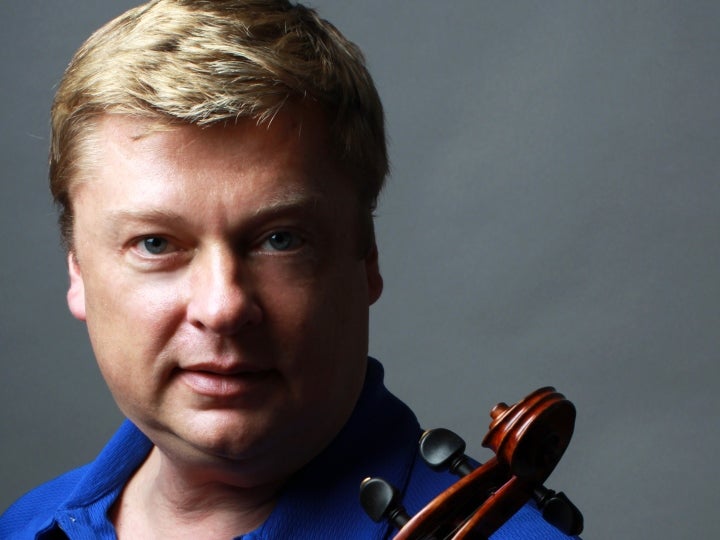
 Frank Foerster, Principal Violist of the New Jersey Symphony since 1988, began his studies at the music school of Hannover, Germany, with André Gertler and Ramy Shevelov. He continued his education at the Berlin Music School with Wolfram Christ and in Gstaad, Switzerland, with Yehudi Menuhin. Foerster came to America to study with Lillian Fuchs and Karen Tuttle at The Juilliard School, where he received Master and Doctor of Musical Arts degrees. After winning numerous competitions in Europe, he became the first solo violist to win the Artists International Auditions, which led to his New York recital debut in Carnegie’s Weill Recital Hall.
Frank Foerster, Principal Violist of the New Jersey Symphony since 1988, began his studies at the music school of Hannover, Germany, with André Gertler and Ramy Shevelov. He continued his education at the Berlin Music School with Wolfram Christ and in Gstaad, Switzerland, with Yehudi Menuhin. Foerster came to America to study with Lillian Fuchs and Karen Tuttle at The Juilliard School, where he received Master and Doctor of Musical Arts degrees. After winning numerous competitions in Europe, he became the first solo violist to win the Artists International Auditions, which led to his New York recital debut in Carnegie’s Weill Recital Hall.
Foerster has performed with the Berlin Philharmonic under Herbert von Karajan and the New York Philharmonic under Leonard Bernstein. He performed Bartók’s Viola Concerto with the New Jersey Symphony under the baton of Zdenek Macal. As a winner of the Aspen Concerto Competition, he performed Hindemith’s Der Schwanendreher with the Aspen Festival Orchestra.
Not long after being appointed New Jersey Symphony Principal Violist by Music Director Hugh Wolff, Foerster scored an important triumph at Carnegie Hall, playing Sancho Panza to cellist Carter Brey’s Don Quixote in Strauss’ famous tone poem. New York Times critic Donal Henahan wrote, “Frank Foerster, smooth-toned and cultivated, had the virtue of forcing you to remember that the old knight’s servant, though a peasant, was a noble soul.” Bill Zakariasen of the New York Daily News wrote, “Kudos to violist Frank Foerster, who brought Sancho Panza as fully to life as Brey did with the Don.”
As a soloist and recitalist, Foerster has appeared in most concert halls in the metropolitan area. In addition to his position with the New Jersey Symphony, Foerster currently serves as principal violist of New York Scandia Symphony and is the violist of the Scandia String Quartet. He is also a member of the chamber ensemble Vista Lirica and the Zanoli String Trio. He has been a member of PULSE and the Numinous Jazz Ensemble, groups dedicated to premiering and recording new works of contemporary composers.
He displayed his composing talents in a recital at Manhattan’s Donnell Auditorium with pianist Colette Valentine; they performed three of Foerster’s compositions for viola and piano: Tourmaline, Moonstone and Aquamarine.
He has been commissioned to write several works for New York Scandia Symphony, most notably his Scandinavian Suite for solo viola and string orchestra (2008), which music critic Andrew Ackers described as “a triumph of a composition, spirited and decidedly authentic … a haunting feast of contrasting emotions, timbres and attacks.” After hearing his Summer in Fort Tryon Park in the Victor Borge Auditorium in Manhattan, Lucid Culture critic Alan Young praised Foerster as “a first-rate composer,” and an New Jersey Symphony string quartet subsequently performed the work at the 2012 Cape May Music Festival. The International Music Company of New York recently published his arrangement of Vieuxtemps’ Souvenir d’Amérique for viola and piano.
In 2010, he started Beowulf Consort with singer Hanne Ladefoged-Dollase and harpist José Rodriguez. This enterprising ensemble has presented colorful and imaginative concerts at Lincoln Center, Columbia University and Newark’s Cathedral Basilica of the Sacred Heart; the trio has also performed educational programs for young people. The group has received invitations to participate in several European festivals next season.
An avid educator, Foerster has created several musical fairy-tale programs for students by retelling timeless classics in an original and humorous manner and adding string quartet music to them. Some of these exciting and engaging programs have been presented through the New Jersey Symphony’s education and community engagement programs; they have been very successful in bringing understanding and appreciation of classical music to the new audiences of tomorrow. Foerster’s own story “The Troll and the Dinosaur” has been presented by the New York City parks department on several occasions (complete with child actors and a full-size dinosaur puppet, created in Denmark for the occasion), including at the very popular Medieval Festival at the Cloisters in 2011.
Foerster is on the faculty of New Jersey City University, teaching viola, violin and chamber music. He previously taught at the City University of New York (CUNY in the Heights) and taught orchestral repertoire at Columbia University. He has presented master classes at Lincoln Center’s La Guardia High School of the Arts and at Juilliard’s Music Advancement Program for minority students. As a guest artist, he has coached chamber music groups at the Juilliard Pre-College Division. At the convention of the American String Teachers Association (ASTA) in Jersey City in October 2011, he led a workshop designed to help students and string teachers prepare effectively for the New Jersey All-State Orchestra auditions.
He has participated in numerous summer festivals as a teacher and performer, both in the United States and abroad. Recently, he joined the faculty of the Atlantic Music Festival at Colby College in Waterville, Maine, where in previous years he has taught master classes on Bach and on audition preparation, in addition to performing as soloist in Solbong Kim’s viola concerto.
-
Question & Answer
-
When did you join the New Jersey Symphony? What is your educational background?
I joined the New Jersey Symphony in 1988. I came to America in 1984 to participate in the Aspen Music Festival. There I met the legendary violist Lillian Fuchs, who invited me to study with her at The Juilliard School. I received both my master’s and doctoral degrees there. Prior to this, I studied at the Music School in Berlin and at the Yehudi Menuhin Academy in Gstaad, Switzerland.What inspired you to become a professional musician? Was there a pivotal event?
My grandfather was a violinist, and my grandmother sang at the opera in Dresden in the 1920s. They often came to visit, and there was always music in the house. At an early age I taught myself to play the piano so that I could join in. Another pivotal event was seeing the Juilliard Quartet perform on German television. Their playing had such thrilling fire and intensity! I remember thinking, “That must be the most fabulous way to make a living—that’s what I am going to do.”What is the most unique or interesting job you have had outside of the New Jersey Symphony?
While studying in Berlin, I played as a substitute with the Berlin Philharmonic, which gave me the opportunity to work under many of the world’s great conductors. To work under Leonard Bernstein in New York was another unforgettable experience. Like a chameleon, he seemed to transform himself according to the different types of music he conducted.Who are your favorite composers and why?
Verdi and Sibelius. Verdi knew the human heart well; his music speaks to us with invigorating wisdom. I like the sincere passion of Sibelius’ music, the atmospheric beauty of his harmonic language and his courage to be experimental and unusual.If you were stranded on a desert island, what would you have with you?
I am an avid reader. I would like to bring all those favorite books that have affected my life in a meaningful manner to read them once more. I would bring, among others, Paul Bowles’s “Sheltering Sky,” the books of Carson McCullers and Truman Capote, Eugen Herrigel’s “Zen in the Art of Archery” and Homer’s “Odyssey.” A good book is like an old friend and confidant: it feels reassuring and comforting to visit them again.What are your hobbies?
As a certified yoga instructor, I started teaching yoga classes at the City University of NY in 2006. Recently, I started to do some composing; currently I am working on a piece for viola and orchestra, commissioned by New York Scandia Symphony, that is based on Scandinavian folk melodies. We will premiere it next May.If you could have dinner with any three people in history, who would they be and what would be on the menu?
I would much prefer to have a nice cozy dinner with my fellow players of the New Jersey Symphony. Each week we have so much to talk about: new programs, new conductors, interpretations and playing styles. There never is enough time to discuss it all! Amidst such splendid company it almost wouldn’t matter what food was being served.
